37 Unique "Why This College" Essay Examples for Top-20 Colleges

Here's the secret to writing your "Why us?" and "Why this college?" essays:
Admissions officers ask these questions because they want to see if you'll be a good match for their school—both academically, socially, culturally, and otherwise.
Admissions officers are trying to answer these 4 questions about you with this essay:
- Are you genuinely interested in our school? Is there a good chance you'll go here if we accept you?
- Do you have what it takes to be a successful student here? What does this essay reveal about you that we didn't already know ?
- Are you a good fit for our school and the culture? Will you positively contribute to the school if you attend?
- Do you have an idea about what you want your future to look like, and will our school help you fulfill that vision ?

Biggest Mistakes Students Make in "Why This College" Essays
Most students approach these essays with generic answers that focus too heavily on the school itself.
Things like... "I want to go to Yale because it has..."
- "amazing academics"
- "world-class professors"
- "interdisciplinary education"
- "a hands-on approach to learning"
Then, most students throw in a few specific, but generic, qualities about the school, like...
- "I want to research with Professor Chiang about the impact of climate change on population decline"
- "I imagine joining the Yale Debate Team where I could continue my passion for public speaking"
- "I'd love to take ECON 142—Behavioral Economics as I'm interested in the intersection of psychology and economics"
This is generic .
It's super generic because it doesn't tell the admissions officer anything about you .
Anybody could write these things. Admissions officers already know these things about their school.
A Better Approach to "Why This College" Essays
A better approach is to focus on yourself .
Specifically, what's a unique, specific, and interesting idea that you can explore?
Exploring ideas always make for the best essays, because sharing your thoughts is what tells the admissions officer the most about who you are.
A better approach would be something like...
I've always been fascinated with abstraction. Whether within math, physics, or computer science, abstraction is what ties it all together. And at Yale, abstraction isn't an afterthought or begrudging obligation, but it's at the heart of learning. From the Engineering Physics Club, which focuses on abstracting the theoretical physics behind engineering feats and then instantiating those learnings to create new engineering solutions, to the Leitner Observatory, where I could work with astrophysicists and infers vasts amounts of knowledge from seemingly chaotic data, Yale embodies the cycle of learning I've come to love: abstraction and instantiation, understanding the mysteries of the universe and engineering solutions based on them.
So why does this approach work so much better?
- It focuses on an idea : a specific, unique reason that matters to you.
- It's not focused too heavily on the school itself, but rather what you value and how the school can help you fulfill that.
- It connects tangibly to the school's offerings, without just listing generically.
Find an interesting, unique, idea.
It could be...
- "solving systemic problems by taking full accountability"
- "promoting social justice through radical honesty"
- "reducing the latency of communication to deepen our learning experience"
Or any other ideas that matter to you.
Then, connect your idea to the school's offerings.
Any student could also mention the "Engineering Physics Club" or the "Leitner Observatory", but the difference in how you mention these things.
What do these opportunities represent? How do they tie into that idea ?
Now, let's look at some examples of "Why this college?" essays that worked for top-20 schools.
I've gathered 37 "Why us?" essays that range in topics, quality, and schools, so you can see what works and what doesn't.
Let's dive right in.
37 "Why This College" Essay Examples
1. "why northwestern" essay example.
Prompt: "Why Northwestern" Statement:
While other parts of your application give us a sense of who you are, we are also excited to hear more about how you see yourself engaging with the larger Northwestern community.
In 300 words or less, help us understand how you might engage specific resources, opportunities, and/or communities here. We are curious about what these specifics are, as well as how they may enrich your time at Northwestern and beyond. (300 words max)
I love Northwestern’s academic flexibility, including the freedom of the curriculum to explore a variety of fields and the emphasis on cross-department study. Also, the quarter system provides a faster pace of learning and the opportunity to take more classes than a semester school.
Specifically, I am excited by the Spanish and Portuguese department and the classes on Hispanic and Lusophone culture, literature, and phonetics. For example, the accelerated Portuguese program is a perfect way to pick up the language at a faster pace using my prior knowledge of Spanish. I intend to supplement my language acquisition through the study abroad programs offered at the Fundação Getúlio Vargas in Rio de Janeiro or an affiliate program in Santiago, Chile. Additionally, the GESI program in Costa Rica is another intriguing opportunity through its intersectionality. It will allow me to combine a practical application of my language skills with studies in environmental conservation that I find a pressing and interesting issue. As an open-minded learner keen to forge links between academic fields of study, I believe I would be an excellent fit for the program.
I am also interested in Linguistics and pursuing undergraduate research or possibly undertaking the coterminal BA/MA program. The opportunity to link my research to a modern language of choice and investigate, for example, regional variation in Latin American Spanish or how Portuguese loanwords have infiltrated native Amazonian languages sounds fascinating and exciting.
Finally, the unique sense of community at Northwestern captivated me when I visited campus. The residential college system, the school spirit at Wildcat games, and the friendliness of the students I met, one of whom described the school as “the most welcoming place ever”, were all emblematic of this atmosphere for me. I think I will thrive in such a dynamic and inquisitive place.
2. "Why Northwestern?" Essay Example
The only reason I fear going for lunch in a hotel is probably because I wouldn’t choose between fried chicken and roasted meat and so is my dilemma over my college major. The multifaceted whole brain approach at McCormick, however, grants me the perfect opportunity to pursue my interest in Computer Science whilst acquiring the appropriate skills in entrepreneurship to a one day startup as an innovator.
As a NU computer scientist, I particularly look forward to Software Development EECS 473 – NUvention: Web, through which I would not only learn intricacies of Software development, but have related studies in real time software development in relation to market requirements in CS+X that would form a base for a startup. That would also provide a bridge for me to join Prof Todd Warren at Farley Center for Entrepreneurship and Innovation where I would specifically join the NUvention; Web + Media. Through this unparalleled program I would have the intimacy of working in a team with fellow wild cats towards an innovative business project. The results of which will be an introduction to the Northwestern Innovation and New Ventures Office (INVO) through which I look forward to gaining practical exposure in launching businesses to the general public.
Outside McCormick, I would be excited to pursue the Managerial analytics Certificate program at Kellogg to acquire intelligent business management skills, let off steam at SPARK exploring hacks while fostering entrepreneurial habits, and eventually joining preparations for the Benedictine Eagle Invite at the Henry Crown Sport’s Pavilion (SPAC) with the NU track club. I may not the best of singers, but I do have intense phases of music obsessions and where best to let it off than taking non major classes at Bienen and, joining one of the numerous Acapella groups as I await Armadillo day!
3. "Why Northwestern?" Essay Example
Why Northwestern? Because this introduction was so difficult to write; because I cannot possibly summarize these reasons in one introductory sentence. Simply put, my interests span across a wide range, and Northwestern has a place for them all.
As an enthusiastic programmer and advocate for positive minority representation in the media, I hope to combine both these interests and conduct research on the influence of media on society. To my delight as a prospective communications major, the School of Communication's research labs showcase project topics ranging from the depiction of STEM in media to improving digital communication. I look forward to taking advantage of the high-quality research, internship and even career opportunities offered to explore my ideas.
My multiple passions keep me creative and energetic, and I plan to continue pursuing them at Northwestern. With years of editing and writing experience for school publications under my belt, for instance, I hope to join the staff of Helicon and North by Northwestern . Last but not least is the constant school spirit and sense of inclusion present within campus. During my campus tour, each tour guide seemed genuinely excited to introduce prospective students to the school. As my particular tour guide described the quarter system and tradition of guarding and painting the rock with passion in her eyes, I knew that only at Northwestern could I find students as enthusiastic about the school itself as they are about their majors. I also spotted many students of color while visiting; as an Asian woman, Northwestern's focus on diversifying reassures me that not only will I not be judged for my background, but that I will get to meet students of all ethnicities and cultures.
College is a time of self-discovery, and I firmly believe I can see my dreams become reality at Northwestern.
4. "Why Northwestern?" Essay Example
I felt the cold sheets beneath me and the beeping sounds of a monitor next to my bed, my chest moving up and down and my body sinking into the mattress. I opened my eyes and was greeted with a plastic surgeon holding the cyst that was once in the corner of my eye. Medicine, I decided, was my destiny.
Flash forward to 8th grade, the year I decided to read 100 books. Emerson, John Green, Ernest Cline--you name the author, I read them. I became instantly inspired to learn to write like the wonderful authors I had read. So, writing, I decided (maybe), was my destiny.
Wait--or was it medicine? Well, perhaps it can be both.
The thing I find most striking about Northwestern is its emphasis on the word “AND.” Northwestern students can love computer science AND music theory, poetry AND Latin History, journalism AND business--I can love science AND English. At Northwestern, my interests would not be hindered by strict and unwavering guidelines. Rather, they could be effortlessly streamlined and integrated into one another. I could go from PSYCH 361--Brain Damage and the Mind to ENG 206 - Reading and Writing Poetry to Carol Clayberger’s Lab to continue my extensive research on T-lymphocytes, similar to that I conducted at UPMC. I would be learning each level of the human psyche, communicating my thoughts through writing, and putting them into action through my research.
At Northwestern, I plan to take advantage of the various resources that would enable me to pursue my passions, find new ones, and combine them into one, pulling from both sides of my brain. I know that I am right for Northwestern and Northwestern is right for me because we have a mutual understanding of what education should look like--emphasis on “AND,” not “OR.”
5. "Why Tufts?" Essay Example
Prompt: Which aspects of the Tufts undergraduate experience prompt your application? In short, "Why Tufts?" (150 words max)
The cross-curricular focus and freedom of study at Tufts would allow me to pursue an interdisciplinary major and draw together my love for Spanish, Portuguese, Linguistics, and the natural sciences. This unique ability to design my own major by combining elements from a variety of academic fields definitely excites me. To support this, I intend to participate in the study abroad program in Chile or a civic semester in Urubamba, Peru that will allow me to practice my language skills while also benefitting the local community and gaining an invaluable cultural understanding through intimate homestay experience. Other than the academics, the vibrant community at Tufts also attracts me, with the warm and compassionate students acting as flattering adverts for the school. One student I spoke with described the average Jumbo as “goofy and loving” which I feel accurately matches my own character and outlook.
6. "Why Tulane?" Essay Example
Prompt: Please describe why you are interested in attending Tulane University (optional). (50-800 words)
I need a meaningful education to be a meaningful educator. Tulane is unparalleled in its dedication to development of the students, on a personal and intellectual level. From when I touch the Victory Bell after Convocation all the way to when I say farewell at the Wave Goodbye Party at Commencement, I’ll have changed and grown, both in my mind and in my heart.
Why This Essay Works:
For "Why Us" essays, it's critical that you imagine how you'll be involved on campus. One strategy is to research specific initiatives, events, or programs already taking place. The more unique these are to the school, the better. Then, talk about how your personal interests would make you a perfect fit for participating in these opportunities. Don't reference too many (over 5 is pushing it) in a committal way (i.e. saying "I will do XYZ") because it can seem unrealistic. Instead, focus on a handful that you're most interested in, and then you can reference others as "possible" ways you'd get involved.
For "Why Us?" essays, one of the hardest parts is finding what is super unique about the school that other colleges don't offer. Most colleges have similar research, curriculum, sports, clubs, etc. While those can be good references (if unique to the school), it can sometimes be easier to find unique aspects by focusing on the intangibles: the culture, approach to education, values, character of student body, ideals they uphold, etc. Having a combination of both unique offerings (programs, opportunities, curriculum, etc.) and ways the school is unique in its approach will make for the most compelling reasons for "Why Us?".
What They Might Improve:
Avoid telling admissions officers what they already know about their school. You don't need to repeat the school's history or information about its faculty, unless there is something exceptionally unique about it that you're pointing out. Admissions officers will already know these facts, so instead jump into the "meat" of your point. Focus on the unique aspects that make you interested in the school, rather than the ones that could be said about almost any school.
7. "Why Tulane?" Essay Example
What starts with the letter P and is distinct to Louisiana and not the other forty-nine states? This question stumped my fifth-grade class when our resource teacher was giving a lesson on Louisiana culture. Among hands that threw out guesses, such as ports and Lake Pontchartrain, my minuscule fingers, like unwrapping a Christmas present, unveiled the correct response: parishes. It was this moment that sparked my awakening of Louisiana’s profoundly unique traditions and history, ranging the gamut of culture, such as food, music, and holidays.
From Gumbo to Zydeco to Mardi Gras, these distinctions made Louisiana my home when I emigrated at the age of three from Mexico, which, like Louisiana, shared the status of owning an inimitable culture; from an early age, I took comfort in this common characteristic. Basking in rich traditions, Tulane joins Louisiana and my Hispanic background to form a trio of diversity. With staple practices, such as swinging beads into a tree or Crawfest, Tulane fosters a living and learning experience that is grounded in unparalleled traditions, offering enlightening and invigorating undergraduate opportunities to explore social milestones.
In its liberation from normal college practices, Tulane encourages students to kindle a life that is eccentric but indicative of the individual beliefs of a student. Because of Tulane’s vigorous ties to special traditions, I would be humbled to have Tulane advise me in crafting my art piece adorned with decorations, my life adorned with personal values.
In addition to the customs on Tulane’s campus, another reason I want to attend Tulane is because of the university’s integration with the most vivid city in the United States: New Orleans. Inside this bright, bustling city, Tulane students participate in myriad festivals and celebrations, cultivating a new social perspective. Aside from the social revelations, New Orleans is Tulane’s classroom, inviting students to apply classroom discussions and academic theories to the neurons of interactions between individuals, businesses, agencies, and other entities.
Tulane returns the favor to New Orleans through community service, serving as a catalyst for students to aid a city often decimated by natural or social injustices. Moreover, Tulane emphasizes its commitment to community service throughout its undergraduate population. As a Louisiana resident, I am invested in Louisiana’s unique physique, whether it is being ecstatic for a super bowl win secured by the Saints or being sympathetic to victims of flooding. Heeding the advice of a stockbroker, it is wise to invest in a system that will provide a generous, satisfying return. Therefore, I would like to make an investment of my leadership potential, my academic excellence, my service dedication, and my social experiences into Tulane University. This investment would reap mutualistic rewards because I would be the beneficiary of a robust education and Tulane would be the beneficiary of a loyal student, who is pious to the university’s commitments to diversity, learning, and service.
8. "Why University of Michigan?" Essay Example
Prompt: Describe the unique qualities that attract you to the specific undergraduate College or School (including preferred admission and dual degree programs) to which you are applying at the University of Michigan. How would that curriculum support your interests? (100-550 words)
Growing up, I always pictured myself as a great teacher as an adult. With the second best secondary education program in the country and an emphasis on the liberal arts and undergraduate education, I am confident that U-M will shape me into the great educator I’ve dreamed of becoming since I was a kid.
Hallmarks of a liberal arts education include teamwork, problem-solving, clear writing, and effective communication. These are also skills that any exceptional teacher needs. U-M offers an unparalleled curriculum that prepares students to successfully run classrooms and obtain Provisional Teacher Certifications upon graduation, exposing students to diverse classes and people in Ann Arbor, and providing them with an invaluable liberal arts education along the way.
Being an effective teacher means connecting with and stimulating all students at its core. The liberal arts foundation I will receive in the College of Literature, Sciences, and the Arts (LSA), married with the experiential education and training the School of Education (SoE) will provide, will mold me into that great teacher—a mentor and role model for any student, regardless of creed—I’ve always aspired to become.
The Teacher Education Preferred Admission (TEPA) for incoming freshmen piqued my interest because the program is the crossroad between the liberal arts and teacher education; two components I was looking for in a college. TEPA will allow me to build a strong liberal arts base in LSA my first two years on campus before entering SoE, while also gaining beneficial experiences in the education field early on.
The education-oriented programs WE READ and Students Empowering Education specifically appealed to me because they will bridge my liberal arts education with my anticipated career as a high school English teacher. Similarly, my Spanish classes will have a practical application in the Ann Arbor Language Partnership, a program that immediately interested me as a potential Spanish minor.
During my first two years as a pre-admit, I'll be supported by my TEPA peers and staff, specifically from my SoE personal adviser. TEPA will take the large campus and make it feel smaller, allowing me to form organic connections with like-minded people and groups that can cultivate my interest in education before entering SoE junior year.
I need a meaningful education to be a meaningful educator. Truthfully, I could go to almost any college to become a teacher, but only schools that synthesize in- and out-of-classroom learning like SoE produce great ones. U-M ranking sixth in the country for undergraduate teaching bolstered my interest in the university and confirmed what I already knew: I will receive an education in LSA and SoE that will change who I am as a person and not just a student, and prepare me to provide the same for others as a teacher.
The great educator I’ve always envisioned myself becoming is one that can inspire without bounds. From my time as a student, I’ve come to realize that a truly influential teacher can work with students who have little in common with themselves and still be impactful. LSA's purposeful and broad curriculum, paired with SoE's hands-on courses and fieldwork, and the additional opportunities available through TEPA, will shape me into that life-changing teacher, for any student who walks through my classroom door.
9. "Why University of Michigan?" Essay Example
Growing up in a community that bleeds maize and blue, the community represented by the University of Michigan has always been one that I could see myself representing as both a student and alumni. From football games at the big house to classes at Ross, each and every opportunity available at U of M represents a piece of my life that I hope to continue to incorporate into my life for the rest of my life.
The opportunity to take courses that allow for enriched experiences in developing a real business is one that I intend to be involved in as soon as possible. I will use this type of class as a way to test my skills and learn where I need to become stronger as a leader and student. Watching others equally driven as me, their tactics that are successful and not successful will imprint on how I attack problems in the future and shape my overall leadership style.
By being involved in the Multidisciplinary Action Projects down the road as a graduate student, I hope to learn firsthand what it takes to run and be involved with real businesses. Firsthand exposure is the best way to learn how to solve problems- especially surrounded by peers who are equally as driven and dedicated as I am.
Filled with students striving for nothing but the best they are capable of is a community that I am certain I will enrich and fit into. By sharing ideas and collaborating together instead of against each other, each and every one of us will contribute to the business world as leaders and innovators.
The University of Michigan is a place I can see myself learning and growing as a leader for the next four years as I intend to use all of the tools at my disposal to become a top business person. The opportunities within the school I will be involved in and the peers that I will work beside only enrich the values of what being a Wolverine mean to me.
10. "Why University of Michigan?" Essay Example
The University of Michigan’s College of Engineering has a proactive approach to career path discovery and job search. While I do hope to aspire to a corporate attorney, an engineering degree from the University of Michigan would provide me the advantage of readiness.
U.S News and World Report published an article about challenges law school applicants with STEM degrees face. Number one was the lack of research skills. Michigan Undergraduate Engineering has research opportunities for all undergraduate students. I hope to even take advantage of The College of Engineering (CoE) International Internship Program. The chance to see the world and contribute to the world-class studies conducted by Michigan Engineering students is a unique quality. The article also reported that STEM applicants often lack job experience. Michigan Engineering hosts internship fairs, which even freshman can participate in. By utilizing the opportunity to work in a professional setting, I will be more adapt to presenting myself in a mature and respectable manor in a corporate setting.
Many people are puzzled by my aspirations to become a corporate lawyer with an engineering degree. While I enjoy learning about many areas of study, math and science have always peaked my interest. Like my attraction to law, I am drawn to the definitiveness of engineering specifically. While there is a right and wrong in methods and procedures, there is a chance to be creative; for the end goal is functionality. Law requires critical thinking, problem solving, and the questioning of presented facts and figures. These skills are also encompassed in Michigan Engineering. With a technical understanding of industry and engineering, I will be able to more accurately represent a corporation. Like the professors at Michigan Engineering, I hope to be an expert in my field. At Michigan Engineering, I will be educated by the best of the best. Professors that have been exposed to their fields in every aspect; allowing them to provide the best guidance to students. Instead of just presenting facts and figures in a courtroom, I will be able to understand and explain them.
11. "Why University of Michigan?" Essay Example
In my junior year microeconomics class, my teacher extensively explored the ways in which people from different socioeconomic classes were affected by our economic system. I was frustrated by the ways our country forces those living in poverty to spend the little money they have on taxable goods. I began to empathize with them. How can people pull themselves out of poverty if their government seems to be working against them? More than anything, I was frustrated that I felt powerless to help them in any way.
Those lessons inspired and motivated me. I had always looked at economics as nothing more than an analysis of business models and resource allocation. I began to see it as a way to fix fundamental problems in our society, from examining the effects of healthcare expansion on crime and poverty rates to studying how shifts in our political climate affect how our country’s financial process will change. I now see economics as a way to help those in need in my country and throughout the world.
I volunteered after school for Representative Dingell and had the opportunity to attend numerous events hosted by the Ford School. Again and again, I was impressed by the extent of the Ford School’s student involvement in critical issues. Through my work with the Congresswoman, I was able to gain a greater understanding of how different groups of people were affected by shifts in political and economic priorities. My goal is to become a civil rights attorney or study economics as a way to promote sustainable growth in developing nations.
I want to begin my studies at the University of Michigan in LSA to gain a foundation in economics and political science-related courses. After my first year, I hope to gain admission to the Ford School. The connections that LSA and Ford have to Poverty Solutions solidified by interest in the University of Michigan. If I attended these schools as an undergraduate student, I would be able to assist with research on the causes and ramifications of poverty. Professor Michael Barr’s research on policy initiatives and our financial system is fascinating from the perspective of a prospective economics major. At the University of Michigan, I would be able to join teams of renowned researchers working toward the betterment of our society and our world.
The range of schools working in connection with Poverty Solutions is evidence of the University’s devotion to civic engagement. I would be able to participate in groundbreaking research regarding issues I am interested in; I would have the ability to study poverty and ways to stunt or alleviate its effects in other countries. As someone hoping to pursue a career in public service, it is truly incredible to have the opportunity to join a research community specifically geared toward solving problems I am passionate about solving.
I want to join the University of Michigan’s legacy of innovators. I want to be part of the LSA community, studying economics and political science. I want to attend the Ford School and understand how policy in America and abroad has an effect on global poverty. I want to be involved with the Poverty Solutions Initiative, conducting groundbreaking research on the ways we can reform our financial system to better serve the lower and middle classes.
12. "Why Oberlin?" Essay Example
Prompt: How did your interest in Oberlin develop and what aspects of our college community most excite you? (250 words max)
“Give Oberlin a look” my father suggested. A school I knew little about. I casually added Oberlin to the long list of schools of which Tufts was perched atop. My father had gone to Tufts and I had convinced myself that I should follow.
Adding Oberlin to my list begat the serendipitous series of events that ultimately saw a fly-in invitation to Oberlin in my email inbox. My father encouraged me to go; “It doesn’t hurt to listen”.
The most influential component of Oberlin were the people. My host, Estrella, like every Oberlin student I met, was generous with her time and her experiences. It wasn’t 24 hours before I could imagine myself laughing with friends at the 10 pm dinner, dozing off on a swing bench in Tappan square, spending late nights at the library in a womb chair, or petting kittens in some little art store. Sharing a day with these people who were clearly in the right place brought some force to my mind that Oberlin was the right place for me. My short trip revealed that Oberlin offered me both the academic rigor I seek and the visceral experience of living in a community of people with broadly varying backgrounds─an experience that I had in this small Ohio town and nowhere else.
I don’t know whose essay I’d be writing right now if this opportunity had never presented itself, but I am very grateful it did.
13. "Why Dartmouth?" Essay Example
Prompt: While arguing a Dartmouth-related case before the U.S. Supreme Court in 1818, Daniel Webster, Class of 1801, delivered this memorable line: “It is, sir,…a small college, and yet there are those who love it!” As you seek admission to the Class of 2026, what aspects of the College’s program, community, or campus environment attract your interest? (100 words max)
I see myself nestled under the wooden arches of Sanborn Library in my Dartmouth EMT jacket too enthralled in my work to notice the snow flurries outside. I'll take a quick study break with some cross-country skiing at the outing club and then take my professor, Dr. Ackerman, out to lunch at the Hanover Inn to talk about her groundbreaking research in vaccine development. After a conversation on protein engineering and immunology, I'll stop by Foco for an infamous chocolate chip cookie with my friends from our unforgettable freshman hiking trip. I know I'm home when I am at Dartmouth.
14. "Why Claremont McKenna?" Essay Example
Prompt: Why do you want to attend CMC? (150-250 words)
I’ve been able to get to know CMC well, since my sister has relished pursuing her undergraduate studies at this amazing school. I’ve visited Claremont many times, and I’m certain this is exactly the school best positioned to both challenge and support me during this critical stage of my education.
The person I aspire to be in the wake of my undergraduate studies is a knowledgeable, accomplished and compassionate leader ready to take over our family business. The privilege of diving into CMC’s unique undergraduate major in Economics will certainly enable me to attain the knowledge I will need. The rigorous classes of the inimitable Finance Sequence will definitely challenge me, but I will savor this. My sister often talks about the exuberance with which professors at the Roberts Day School conduct their classes and I hope to experience this. More specifically, I want to study Financial Economics under Dr. Lisa K. Meulbroek and get an insight into the world of corporate finance by evaluating everything from mergers to investments.
A CMC education also complements my intellectual curiosity, since it would enable me to pursue a second major in Religious Studies. This is immensely important to me since I come from an area where religious tensions are spiraling out of control. In addition, to enable me to develop the hard and soft skills of leadership, CMC offers experiential projects and countless opportunities for me to take on leadership roles in clubs and societies I’m passionate about, like the Blockchain club.
15. "Why Indiana University?" Essay Example
Prompt: Describe your academic and career plans and any special interest (for example, undergraduate research, academic interests, leadership opportunities, etc.) that you are eager to pursue as an undergraduate at Indiana University. Also, if you encountered any unusual circumstances, challenges, or obstacles in pursuit of your education, share those experiences and how you overcame them. (200-400 words)
Walking into school on the first day of my senior year, the excitement about college was evident as I passed through the halls. While many students discussed the local options, the one name I heard that really drew me in was Indiana. Unaware of the tremendous opportunities that would be within my reach as a student there, I began to learn more information through both individual research and from discussion with alumni. This was how I knew Bloomington was the place for me.
Always interested in business, the characteristics of the Kelley School run parallel to those that I value in numerous ways. First, because I have taken Chinese for most of my time as a student, international experience is vital to me. While classroom learning is no doubt helpful, continuing my education of the language within the culture will teach me more meaning to the words that I am speaking. Tying in with business, it also will give me leadership experience dealing with planning and collaboration around the globe.
The collaborative community is another aspect of Indiana that I truly appreciate. Dating back to the first group activities I worked on at school, I have always appreciated the helpfulness in working with my peers rather than against them. Working with others to solve problems is not only how I have accomplished so many of my goals, but also how I have made some of my closest friends. Additionally, I will utilize this emphasis of collaboration with my professors at the Kelley School as a way to enrich what I have learned in their classrooms.
While in collaboration with my classmates, friends, and professors, I will begin connecting myself with the future alumna- and eventually become one down the road. Since the Kelley School has the largest alumni population of any other business school, the community I am entering into is sure to be influential in the future. This opportunity to enter this prestigious group will open up doors and give me access to some of the top people in business today.
I cannot wait to be a part of the community within the Kelley School: for not just the next four years of my life, but the rest of my life.
16. "Why New York University (NYU)?" Essay Example
Prompt: Why NYU?
We would like to know more about your interest in NYU. What motivated you to apply to NYU? Why have you applied or expressed interest in a particular campus, school, college, program, and or area of study? If you have applied to more than one, please also tell us why you are interested in these additional areas of study or campuses. We want to understand - Why NYU? (400 words max)
Living in a suburb my whole life, I've always felt as if I lived in a two-dimensional plane. I can go left, right, forward, and backward.
In a suburb, however, it is nearly impossible to get any meaningful altitude. Upon visiting New York City during the summer before my senior year, however, I found myself gazing up at the skyscrapers soaring high above me. I've always loved the views mountains and buildings; both from above and below. I also have spent time studying Mandarin, and Shanghai would offer a unique opportunity to further my linguistic studies while engaging in cultural immersion.
Beyond settings, NYU has the capacity and the resources available for me to engage in research in quantum computation. Playing video games got me into math and science beyond just playing with my calculator as a baby. There were practical applications of the numbers, and I wanted to understand how it all worked in order to get the best equipment and maximize ammo efficiency. I would watch "Mythbusters" and try to come up with my own hypothesis and see if it matched their conclusion.
In 8th grade, I figured out that I loved science along with math, but I didn't exactly know what science I loved. At the time I was in "physical science" and I did enjoy the class a lot, but I always thought of physics as "speed distance time" triangles which were no fun at all. I was convinced to take AP Physics in my junior year with my friends, and I loved it. It was almost every week we would learn something that completely altered my perception of the universe.
Once I learned about quantum physics and how it basically destroys our understanding of everything, I knew I wanted to pursue it further, and be at the forefront of quantum research.
At NYU, not only can I take courses to learn about the subject, but I can also participate in research through the "Center for Quantum Phenomena". Taking advanced courses and conducting research in a new setting, such as New York or Shanghai, can offer me a new perspective and a breath of fresh air. Conversely, I can help over NYU a new perspective on critical thinking and problem-solving. I chose to apply to NYU because NYU is fit for me, and I am fit for NYU.
17. "Why University of Michigan?" Essay Example
Riding the elevator to the seventh floor of Haven Hall, my heart was practically leaping out of my chest. I was meeting with Dr. Jenna Bednar of the College of Literature, Science, and the Arts Department of Political Science, and as I recalled her credentials- B.A. in Political Science from Michigan, M.A. and PhD in Political Science from Stanford- I felt increasingly out of place. As a junior in high school with limited political experience, I am grateful that she agreed to take time out of her day to meet with me and answer my numerous questions about LSA, Michigan, and political theory.
Upon entering her office, my eyes were drawn to bookshelves full of political literature, from the classics like De Tocqueville and Locke (which I read in a summer college program in 2017), to her own recently published work, The Robust Federation. Encouraged by her broad smile and having just completed an official campus tour, I launched into my questions. Dr. Bednar described the connections she and her students have made at Michigan, through LSA and in general.
This revealed to me that the faculty would take a personal interest in my academic career. We discussed the average class size in LSA and the Department of Political Science, her academic background, and how to survive Michigan winters. Dr. Bednar then brought my attention to the benefits that LSA Political Science gives its students.
For example, as head of the Michigan in Washington program, Dr. Bednar's passion for both political science and education was evident as she introduced me to one of Michigan's most influential academic programs. Although I hail from two miles outside the D.C. border, I aspire to participate in the Michigan in Washington program, to build on my internship of the past year with my delegate to the Maryland General Assembly.
Under his guidance, I conducted nationwide policy research, attended civic association meetings and development forums, and traveled to our state capitol to watch the legislative process unfold. Consequently, an internship at the federal level is my logical next step toward building the foundations of a political career.
Dr. Bednar, upon hearing about my internship with my delegate, suggested that I think about the Undergraduate Research Opportunity Program. I believe that this research program offers a unique means of building my understanding of political science. I am eager to apply to the UROP program in hopes of furthering my research skills within the complex political landscape of today. Furthermore, the variety of courses that I can explore as a political science major is remarkable: from "Sports, Politics, and Society", to "Nations and Nationalism," the scope of topics will keep me engaged.
When I sat down with Dr. Bednar, I expected a five-minute chat; I received forty-five minutes of helpful advice, political theorizing, and well wishes. Leaving her office, I felt energized and ready to dive into LSA Political Science right there. Her demeanor helped to build my confidence to boldly seek connections in my search for knowledge. I saw the Michigan difference firsthand, from various undergraduate opportunities for political science, to a universal love for the school from students and faculty alike.
18. "Why University of Michigan?" Essay Example
My favorite class in high school was also my hardest. It was World Culture/World Literature, an hour and a half each day of seeing history, art, and literature not as separate entities but as intricately connected, one incomplete without the other. I learned to see humanism in Greek sculpture, religious propaganda in the chiaroscuro of Baroque paintings, disillusionment in modern art. Although seemingly unrelated to my STEM-leaning interests, the analytical skills I learned there would prove invaluable in neuroscience research. Connecting electroencephalography results to mechanisms for chronic pain relief wasn’t all too different from drawing links between historical movements and paintings; both required an intimate knowledge of background information and a willingness to take risks, to see new relationships and forge unprecedented connections.
LSA embodies precisely this mentality, fostering interdisciplinary learning and problem-solving. With classes like “Health, Biology, and Society: What is Cancer?”, bridging humanistic and biological approaches to disease, and graduation requirements ranging from Natural Sciences to Race and Ethnicity, LSA prepares students for the real world, where problems necessitate not just single-minded expertise but also a diverse understanding of other factors involved. My internship experience only confirmed the practicality of this perspective; we used mindfulness meditation alongside spinal cord stimulation technologies to treat chronic pain.
This mindset is not confined to learning inside the classroom. The LSA Opportunity Hub is robust, connecting students to internships at Nike, Forbes, and the US Department of Education, among other places. To intern as a research assistant at Mayo Clinic, to use mathematical models to predict brain tumor growth like current Michigan junior Tatum Doyle would be an unequalled opportunity. Her work in incorporating mathematical concepts in medical research personifies the LSA culture, where problems are best solved holistically. LSA’s interdisciplinary approach does not detract from fostering specialization and excellence in specific fields, but adds; its Biochemistry program promotes innovation and independence in its students and is ranked top in the nation.
I remember boiling down cabbage with my dad to make acid/base indicators. In elementary school, my teacher wrote that I had been spending too much time reading animal books and too little time playing with other kids. I loved (and still love) all things living, often marvelling at the complexity of the animal kingdom, the human body, the organs, and the cells that were the foundation for everything else. The first time I read about the process of translation, of rendering mRNA into proteins, my eyes filled with tears; this is what I wanted to do, to apply the chemistry that had defined my childhood to my love of biology.
LSA shares that passion, dedicating a plethora of resources, both intellectual and material, to its Biochemistry department. With equipment like atomic absorption spectrophotometers, classes in Endocrinology, and distinguished professors, the University of Michigan has everything any biochemistry undergraduate student would need, and much more. To research under a PI like Dr. Kopelman, winner of the J. William Fulbright Research Award, would be a dream fulfilled. His work in employing 5-dimensional chemical imaging to visualize and treat tumors does what LSA does best; it uses an interdisciplinary approach to make academic discoveries both relevant and essential in the real world. It is a culture I would be honored to take part in, should I be accepted.
19. "Why University of Michigan?" Essay Example
Sweat drips down my face onto homework in front of me.
I just got home from a soccer game; I’m not stressed. This is until I realize I still have a plethora of edits to make on my lab report as well as emails to write for an upcoming NHS event. AND I have three tests the next day.
Although stressful, I enjoy every minute of juggling a variety of academics and extracurriculars. I appreciate all the opportunities my high school offers to me and I take advantage of as many as I can handle. Thanks to my involved years of high school, I have received a great education as well as many experiences I would never trade away.
Entering my senior year and researching universities I may want to attend, there is one question which continuously presents itself. What do I want to major in when I get to college? It is a scary question and I have never known the answer. Despite participating in many extracurriculars such as National Honor Society, Science Olympiad, Math Honor Society, and Future Business Leaders of America, I still have no idea what I want to do with my life.
As a student at LSA, I would be able to use the abundance of resources to explore possibilities for life after college. Since I am one of the many college applicants who has not decided upon a major, a large, liberal arts college like LSA is the perfect place for me to discover more about myself, pursue interests, and find my purpose. I have considered medicine, business, economics, and law. The two courses I have enjoyed the most are biomedical sciences and US History. I am truly all over the map!
With so much variety at LSA, I would be able to change majors or take a diverse group of classes so that I could find what I want to study. LSA is unique from its University of Michigan counterparts because it offers a broader range of departments, majors, and courses. The flexibility at LSA would help me discover what I want my life to be like while supporting me through my journey.
Additionally, LSA provides students with multiple opportunities not found anywhere else at University of Michigan. One program that caught my eye was Michigan Learning Communities. This program appeals to me because having the resources of this large university, yet finding a niche in the community to challenge myself and others, can help me grow as a student and a person. Similarly, the Opportunity Hub at LSA jumped out at me as I researched the University and toured the school. I would take full advantage of the great connections the Opportunity Hub provides, as it could help me find an internship or job offer when the perfect time comes. MLCs, the Opportunity Hub, and the many other programs which LSA offers are the main reasons why LSA would be the best college fit for me.
I was initially drawn to the University of Michigan by the beautiful campus, great athletics programs, unmatched prestige, and massive alumni network. However, as I dove deeper, I discovered LSA, a school that can help me realize my purpose and passions while providing a focused learning environment to lead me to a bright future.
20. "Why University of Michigan?" Essay Example
Throughout my college search, I had yet to come across the perfect undergraduate school for my interests. The safe pick was always the standard “College of Arts and Sciences” or its equivalent, with the most varied options for me to craft my experience. Something was different about Michigan. I didn’t need to craft my own academic experience at another university when the perfect one was already designed here: The School of Kinesiology’s Movement Science program.
In my house, we never eat scrambled eggs. We eat denatured albumin and yolk proteins served with a sprinkling of sodium chloride; cooking was chemistry, not just a chore. From a young age, my parents have cultivated a sense of curiosity in me. So when I injured my left wrist in the summer before freshman year, it was so much more than just an injury. I researched more into my growth plate dislocation and radial fracture. I got to see the details of the procedure, the recovery process, and the gradual reversion of my X-rays to a normal wrist image. This fascinating journey got me through an otherwise disappointing summer: no basketball and no french horn.
While the seeds were planted during my injury, they didn’t start blooming until I spent a week shadowing Dr. Kesavan Ramanujan in the Royal United Hospital, Bath, England. I realized that the field of orthopedics was a field where I could visually identify a problem, come up with a solution, implement the solution through operation, and help someone progress to full recovery. The gratification on the doctor’s faces when their recovered patients came back to visit them was infectious. While this trip was my first time staying abroad without my family, the biggest takeaway for me was that I had found a career I was truly interested in.
My volunteer work at the Robert Wood Johnson Hospital Physiotherapy Clinic has only strengthened this notion. While my work as a volunteer may be the more routine tasks: making schedules, doing paperwork, cleaning the beds and the gym, setting up hot packs, cold packs, and stimulation pads, I have learned so much about the subtle details of patient interaction through what I absorb from the physical therapists. Even if a PT is having a bad day, they have taught me how important it is to have a smile on your face for the next patient coming through the doors. They have also taught me how much of an intersection there is between teaching and medicine/therapy.
These experiences draw me to the School of Kinesiology, and specifically the Movement Science program. The opportunity to actively engage with skeletomuscular system studies as opposed to solely classroom learning appeals to me, as do the extensive research opportunities. The specialized IONM Intraoperative Neuromonitoring Program-- the only accredited IONM program in the world-- would give me the chance to engage in an exciting, interdisciplinary curriculum that cannot be found anywhere else.
From scrambled eggs to broken bones; from British adventures to lessons learned in the RWJ clinic. Discovering my passion for orthopedics and movement science has already been an exhilarating ride; yet, these have all been just the beginning steps of my journey. I cannot think of a better place to continue than the University of Michigan.
21. "Why University of Southern California (USC)?" Essay Example
Prompt: Describe how you plan to pursue your academic interests and why you want to explore them at USC specifically. Please feel free to address your first- and second-choice major selections. (250 words max)
All throughout my life, I always loved doing math no matter what the concept. My love for math led to me taking advanced math classes for my grade. I even had to take a bus to a high school when I was in middle school to take an advanced math class. I always knew that I would want to pursue a career dealing with mathematics, but I was not really sure until my junior year. I had not decided what I wanted to be in the future, so my uncle suggested being a CPA, and I looked into it. When I did my research, it interested me as they made a decent amount of money and they worked with numbers.
At USC, I would like to major in accounting and gain the opportunity to possibly receive an internship at one of the big accounting firms in Los Angeles through the networking of USC. If I were able to get an internship, I would be able to gain experience for when I graduate and search for a job. I would also consider going for a Masters of Business Administration as I know that USC has one of the best business programs in the country.
22. "Why University of Southern California (USC)?" Essay Example
I had never considered traveling across the country to pursue an education. In fact, living in Pittsburgh all of my life and growing up with people who are so adamant about staying put, forced me to believe that I too had to box myself into this small, yet evolving city. However, now I can confidently tell my friends and family that I want to travel to California for college (and ignore their odd looks).
What strikes me most about USC is its ability to maintain uniformity despite its diverse student body--in interests, ethnicity, and opinion. There are not many schools where I could be best friends with filmmakers, artists, photographers, chemists, potential CEOs, and writers. Although all of these people are spread across different schools, they still seem to maintain a cultural unity. Being surrounded by such a distinct trojan pride combined with the ambitious atmosphere would be both inspiring and propulsive.
At USC, I would not have to confine to merely one of my interests. I have always had aspirations of becoming a doctor and pursuing neuroscience, but have never felt comfortable ignoring the humanities. As a Trojan, I could pursue research at the Dana and David Dornsife Cognitive Neuroscience Imaging Center or even take part in PIBBS, while also honing my writing skills through the intricate Writing Program.
Much like the students, my interests could somehow be molded into a diverse uniformity, and I could prove my fellow Pittsburghers that perhaps they need to move around more.
23. "Why Cornell?" Essay Example
Prompt: Cornell Engineering celebrates innovative problem solving that helps people, communities…the world. Consider your ideas and aspirations and describe how a Cornell Engineering education would allow you to leverage technological problem-solving to improve the world we live in. (250-650 words)
For "Why Us?" college essays, one of the most important parts is to show ways you imagine being involved on campus. This student does a great job of showing that they've done their research about Cornell, by connecting their passion for studying heart disease to specific initiatives already taking place on campus. Try researching what events, research, or programs are being conducted. By referencing those specifics, you can create convincing reasons of why this school is fit for you.
When discussing your intended area of study, one effective strategy is to identify a problem that you see. This problem can be in the field itself, your community, or the world. Then, you can connect this problem to yourself by showing how you'd want to help solve it. Don't try to tackle it entirely yourself, but show how you'd "take bites" out of this larger problem. It is also important that you identify potential solutions to the problem. You definitely don't (and shouldn't) have all the answers, but what do you see as potential steps for combatting the issue?
Using technical language, such as referencing "semi-elliptical curves" and "modular form" in this essay, will help show your in-depth knowledge and passion. Don't be afraid to use technical jargon like this, and don't worry if admissions officers may not know all the terms. As long as they have context and knowing the terminology isn't critical to understanding your point, including "nerdy" language will make your essay more engaging and demonstrate your intelligence.
If you have personal connections to the school you're applying to (such as legacy, family members who work there, students or faculty you're close with), it can be a good idea to reference those connections. Showing personal connections to the school makes admissions think, "They're already practically one of us!" Just make sure that these connections aren't contrived: only write about them if you have a clear purpose within your essay for introducing them. In this essay, the student references their brother who attended Cornell, but does so in a way that naturally ties into the rest of their reasons for "why Cornell."
24. "Why University of Pennsylvania?" Essay Example
Prompt: Considering the specific undergraduate school you have selected, how will you explore your academic and intellectual interests at the University of Pennsylvania? For students applying to the coordinated dual-degree and specialized programs, please answer these questions in regard to your single-degree school choice; your interest in the coordinated dual-degree or specialized program may be addressed through the program-specific essay. (300-450 words)
As a child the world fascinated me. From questioning the makeup of the dirt I played in, to doubting the existence of gravity as I flew a kite, I was always thinking. Time passed, and my consciousness opened to more, like atoms, the Big Bang Theory, the psychology behind dreams, and the list goes on. Everything fascinated me; curiosity quickly became a part of my character. Some say ignorance is bliss, but I have to disagree. Ignorance is what fuels my curiosity; ignorance is what drives me to discover, learn, and initiate change. Living in a small rural town with my grandmother and disabled father, I have been limited by geography and socioeconomics. A perfect blend of humanities and factualities, the College of Arts and Sciences is an exploratory lab for all I do not know. At Penn, courses from Neurobiology of Learning and Memory to The Sociology of Gender allow me to rid my ignorance one class at a time. The unique and specialized curriculum provides a place to explore whatever I wonder and answer whatever I question. While my grandmother did not have the money for me to attend science camps, to visit museums, or to travel more than a few hours from my home, living in the country always provided me with endless exploration. My interest in trees in particular led me to specialize in the forestry portion of our Envirothon team for four years of high school. The passion I have for biology is second to my interest in helping others. Rural areas of Pennsylvania are in desperate need for physicians, especially in the field of women’s health. My goal is to return to my community and fill that need. As a low income, first-generation student, I have had limited opportunities, but I have seized any that I could and where there were none, I created some. As a seventh grader, I pioneered the colorguard of our newly formed high school marching band. Last year, as captain of 14 twirlers, I took my first plane ride to Disney World where my band performed. This experience taught more than I could ever learn in a classroom. Similarly, there are endless opportunities at Penn, both intra- and extra-curricular, and I plan to take advantage of all that I can to feed my fire.
25. "Why University of Pennsylvania?" Essay Example
This essay does a great job of conveying a thoughtful and candid applicant. Their phrasing, although verbose in some places, comes across genuine because the author walks you through how they learned about the school, what they're looking for in a school, and why the school would offer those specific things. Phrases like "I didn't know if I could honestly see myself studying that" are conversational and natural-sounding, which help create a sincere tone.
By referencing specific programs, like "Penn in Washington" as well as various minors and concentrations, it is clear this student has done their research about the school. One of the most important aspects for a "Why Us" essay is to find specific and unique opportunities and name them in your essay. These could be things like specific professors and their work, campus and its location, interesting classes, unique internship/study-abroad/job programs, special events, and many more. The key is referencing things that are entirely unique to the school and not many other schools too. Avoid broad terms like "renowned faculty" or "interdisciplinary studies" because virtually all colleges offer things like this, and these are some of the most over-used and artificial reasons used in "Why Us" essays.
This essay has many moments of repetition that are unnecessary. In general, avoid repeating your ideas and when editing, ask yourself of each sentence: does this add something distinctly new and important to my essay? There are two common mistakes that often create repetition: prefacing your ideas and summarizing your ideas. Unlike academic writing, you don't need to "prepare" the reader for what you're going to say, and you don't need to conclude it with a summary. By doing so, you only create unnecessary repetition and take up words which could otherwise be used to include new specific details or ideas.
This essay spends nearly half of its words explaining the "interdisciplinary" opportunities at UPenn. However, this reason is quite superficial and not at all unique to Penn, as almost all colleges offer some sort of interdisciplinary study (i.e. combining your interests or studying multiple fields). Talking about "interdisciplinary study" is one of the most common reasons students use in their "Why Us" essay, and it often comes across as generic and unoriginal. Instead, look for offerings that no other (or very few other) schools provide. Narrow down your reasons "why" to make them more specific to the school, even if they are smaller scale. You can mention things like "interdisciplinary studies" or "diverse student body" briefly as a reason why, but don't make them one of your primary reasons why, unless you have something particularly unique about it.
26. "Why Tufts University?" Essay Example
Prompt: Why Tufts? (100 words max)
What struck me most about Tufts was not only the warm, open, and energetic atmosphere, but also the students’ willingness to be walking contradictions. With the ExCollege encouraging interdisciplinary education through classes like EXP-0058-PS Health, Communication & Society, it is easy to be contradictory.
During my visit, I met Biological Poets, Singing Physicists, and Mathematical Artists. I know that Tufts is right for me because it preaches everything I believe about synergistic learning. Being a contradiction my entire life--the scientific, mathematically inclined, yet literature obsessed barista--it was comforting to find a community of people identical to and completely different from me.
27. "Why Tufts University?" Essay Example
Prompt: Which aspects of Tufts’ curriculum or undergraduate experience prompt your application? (100 words max)
Touring a college is not always enough to get a sense of what the college is like. But, I had the unique opportunity to meet with Professor Dennis Rasmussen and discuss Political Science at Tufts. He talked to me about the unique opportunities which Tufts students have, from the fantastic study abroad opportunities to a senior thesis which lets you dip your feet into research before moving onto higher education. The combination of Professor Rasmussen’s thoughtfulness and the school’s academic prowess proved to me that Tufts is the place to be.
28. "Why Northwestern?" Essay Example
Think Purple: Aspiring journalist dreams of being a Wildcat Filed under Admissions, Top Stories
After brochure browsing, website wandering, and campus canvassing what felt like hundreds of different schools, it took Daisy Conant exactly 32 seconds on the Northwestern University campus to realize she had found the one.
“Northwestern is undefinable in the best way, an addicting hub of intellectuality, creativity, and school spirit - something especially appealing to a football lover,” laughed Conant. “But what excites me most about NU is the opportunity to study at the Medill School of Journalism.”
A writer with hopes of becoming a foreign correspondent, Conant has always been drawn to people and their stories, especially those completely unfamiliar to herself and her experiences. Once learning she could start on day one at Medill acquiring investigative journalism experience writing an enterprise story and end on day 600 with a journalism residency and international experience already under her belt, she was hooked.
“Conducting groundbreaking research on the socioeconomic disparities in the CPS system for the Medill Justice Project, spending a semester abroad reporting on cultural crisis in Greece, interning at the Post - at Medill, my options are boundless,” remarked Conant. “I could explore the world of print news writing in-focuses for the Daily Northwestern, dabble in magazine editing laying out spreads for North by Northwestern, even try my hand at broadcast reporting for WNUR.”
A journalist at heart, Conant is fascinated with the intersections of other disciplines. As an NU student she would be free to engage her passions for international studies and business through outside concentrations in addition to investigative journalism, uncovering the adventures (and discovering the tenacious Wildcats) that lie between Evanston and the shores of Lake Michigan. “My story is just beginning,” said Conant. “And Northwestern is the perfect lede.”
29. "Why Notre Dame?" Essay Example
Prompt: What excites you about the University of Notre Dame that makes it stand out from other institutions? (200 words max)
Lou Holtz once said, “You don't go to Notre Dame to learn something; you go to Notre Dame to be somebody.” While I can hardly tell the difference between a linebacker, quarterback and fullback, I know that the advice from the former football coach rings true. Notre Dame will not only provide me with a wonderful education, but will equip me with the tools to pursue a career in government.
Notre Dame’s emphasis on a practical political science education is what first drew me in. The emphasis on equipping students with the ability to do research through the Research Apprenticeship Course and the ability to complete a thesis allow for an undergraduate to get hands-on experience in helping contribute to the body of knowledge in political science.
Further, the ability to obtain internships, especially with the U.S. Department of State and the City of Chicago Law Division emphasize the experiential learning I hoped for. Real-world experience will empower me to solve real-world problems and enter the workforce.
While I may never understand football, with a Notre Dame education I know I will learn to understand political science deeply and be equipped for a successful future.
30. "Why Notre Dame?" Essay Example
When I attended a Notre Dame information session, the admission representative, Zach, told us wonderful stories about campus life. One thing that especially stuck out to me was how diverse Notre Dame is. It was intriguing to think that I could sit down at a lunch table and there would be someone there from Hong Kong, Germany, and Korea. This nurtures my love of cultures different from my own. Also, I’ve spent my whole life in Kansas City, which is roughly 8 hours away from Indiana.
The idea of leaving everything that I’ve grown so familiar with frightens me. A family friend who attends Notre Dame says that you form a close bond with the people in your dorm, but it extends beyond that because it’s like everyone at Notre Dame is family. Even the Alumni stay involved long after they’ve graduated. People are proud to have graduated from Notre Dame, leading me to believe that when you attend Notre Dame, you become a family for life. Notre Dame has a history and legacy of greatness, and I would love to be a part of a school that changes lives like that.
31. "Why Ithaca College?" Essay Example
Prompt: Please tell us why you selected this specific academic program and what other academic programs interest you. (10-200 words)
Recording devices have been banned from the courtroom of the Supreme Court Building since 1946. Therefore, when the Court makes a landmark decision, interns must hand-deliver paper copies of the ruling to news organizations.
The interns often pair running shoes with their business attire, for the quarter-mile sprint from the Court building to the area where networks await.
When I first saw photographs of “The Running of the Interns”, I wanted nothing more than to be one of those people. I wanted to feel my running shoes beating against the sidewalks, to feel sweat staining my suit.
Why did this tradition attract me to journalism? Because it reminded me that the news is a race, a constantly-changing collection of stories shaping social and political development.
The opportunity to contribute to that collection is why, beyond Ithaca’s journalism program, I’m also interested in the College’s minors in Politics and Writing.
I think all of this desire to be part of a story defines what it means to be a journalist, a writer: When I become a journalism major at Ithaca College, and, later, perhaps a running intern, I get to be a contender in the race to change the world.
32. "Why Rice University?" Essay Example
Prompt: How did you first learn about Rice University, and what motivated you to apply? (250 words max)
I live in Ponchatoula, but I am from New Orleans. Most of my family is from there, including my parents, and as a result, I have grown up in a food-loving household. My parents and I decided to take a foodie vacation to Houston since we heard about how amazing the food is there. My mom suggested I research the schools in Houston so I could visit one while we were there. I will admit that I chose Rice simply because it was the highest-ranking school according to a quick Google search. I didn't do any further research.
However, as soon as I stepped through the Sallyport, my nonchalance faded, and I was entranced.
The beauty of the school was nearly enough for me to apply, but I was intrigued when my tour guide spoke about the importance of liberal arts at Rice because I have never been in an environment that held such respect for them. I also loved the housing system of Rice. It reminded me of the houses in Hogwarts from Harry Potter! I felt incredibly welcomed at Rice; I was pleasantly surprised when I asked the tour guide if I could visit the Shepherd School of Music by myself since it wasn't included in the tour, and she told me "of course." As I stepped through the unlocked doors and strolled through the maroon floors of the Shepherd School of Music, I didn't hesitate to inform my parents of my new dream school.
33. "Why University of Wisconsin-Madison?" Essay Example
Prompt: Tell us why you decided to apply to the University of Wisconsin-Madison. In addition, please include why you are interested in studying the major(s) you have selected. If you selected undecided please describe your areas of possible academic interest. (80-650 words)
This essay uses a lot of a great, specific references about UW Madison that show that the author has done their research and know the school well. Your reasons for applying in these "Why Us?" essays should be as specific as possible. This essay uses references to specific professors and their work, lab equipment ("biolayer interferometry"), courses, and features about campus. All of this works to create a compelling reason why this student would be a good fit, while also demonstrating strong interest in the school. When writing "Why Us" essays, doing your research to find unique and specific aspects is most important.
Even for "Why Us?" essays that don't explicitly ask you to write about your major, referencing your intended major is often a strong reason "why." By connecting what you want to study with what the school offers, you can show how your studies would be made even better. Admissions officers are trying to imagine how you'd fit into campus, so try showing them how you'd be engaged in the specific department. Researching the department is also a good idea, as often times it is easier to find unique qualities about a department (like "Biochemistry department") than it is to find about the school as a whole.
This essay starts off with a somewhat unserious introduction, referencing Wisconsin's reputation for cheese-making. Although this is casual and humorous, it serves as an engaging introduction into their main ideas about what the school offers. Using humor can show your personality, while also making it more fun for admissions officers to read. They'll be more likely to find your essay likable if you can include small moments of lightheartedness. This student also shows their personality through interjecting their thoughts (like this is doing here) using parentheses, which works to bring the reader into your thought process.
In this intro, the author sets up three points that they use as criteria for what they want in a school. However, this ultimately ends up creating unnecessary repetition because they later they discuss each of those points in detail. In general, avoid prefacing your ideas or thoughts. That is, you don't have to "prepare" or "introduce" what you're about to say to the reader. Instead, it is usually more compelling to just start with those juicy details rather than setting them up.
34. "Why Cornell University?" Essay Example
Prompt: Describe two or three of your current intellectual interests and why they are exciting to you. Why will Cornell's College of Arts and Sciences be the right environment in which to pursue your interests? (650 words max)
35. "Why Brown University?" Essay Example
Prompt: Why Brown, and why the Brown Curriculum? (200 words max)
I believe any college should equip you with tools as you embark upon your journey. Brown provides the necessary. That is what the capstone experience does (not to mention the importance of internships given to Brown Students). You can never know everything about anything. But quench the questions is exactly what the Capstone Experience fosters.
The Open Curriculum was obviously the first thing that caught my eye. In school, you are sometimes forced to take the subjects you don’t like. College shouldn’t be the same. It is supposed to be a fresh start and that is exactly why you should be allowed to take the courses that appeal to you. Here is where the S/NC option was interesting. Only if you know perspectives from all subjects, can you determine a solution; S/NC promotes this. Group Independent Study Projects is also unique. Getting into the course is something hard. But creating your own course is amusing.
I would love to be a part of The Society of Women Engineers because I had to fight with my own family to study Computer Science in the United States. If it means providing the help for people I wish I'd got, never better.
36. "Why UPenn?" Essay Example
Prompt: How will you explore your intellectual and academic interests at the University of Pennsylvania? Please answer this question given the specific undergraduate school to which you are applying. (650 words max)
37. "Why Carnegie Mellon University (CMU)?" Essay Example
Prompt: Why Carnegie Mellon? (650 words max)
With a strong background in computer science and communications, I hope to incorporate both into a future career of building data systems, conducting research, and consulting for organizations that serve underrepresented citizens.
Specific details and anecdotes will almost always be more compelling than less specific ones. In this essay, the student does a great job of including specific, "nerdy" details, such as "an association test between melanoma associated variants and survival outcome." These details demonstrate your in-depth knowledge of an area and make your essay more engaging.
This essay does a fantastic job of addressing real-world problems and emphasizing the "bigger picture" impact of their studies. Rather than just explaining what they want to study, this student explains how their education will help them have an impact on the world. Make an argument for what problems you see in the world and how you could potentially help solve them.
For "Why Us?" college essays, one of the most important parts is to reference unique aspects to the school. Almost all colleges have strong academics, great faculty, etc. So instead of referencing those points, reference what makes the school unique and different. In this essay, the student talks about "CMU's Technology Consulting in the Global Community" program, which is both highly specific to CMU and relevant to their own interests.
In general, you should avoid simply listing your achievements. This student has many remarkable activities and experiences, but it comes across less interesting because the first half of the essay is simply describing these accomplishments.
For "Why Us?" essays, it is also a good idea to reference the values the school represents. Each school has a different "culture" and type of student body, and admissions wants to know how you will fit in.
What You Can Learn From These "Why This College" Essay Examples
Ryan Chiang , Founder of EssaysThatWorked
Want to read more amazing essays that worked for top schools?
Hey! 👋 I'm Ryan Chiang, the founder of EssaysThatWorked.
Get our 5-minute free newsletter packed with essay tips and college admissions resources, backed by real-life examples from admitted students at top-20 schools.
Meet the Author
Ryan Chiang
I'm Ryan Chiang and I created EssaysThatWorked - a website dedicated to helping students write college essays they're proud of. We publish the best college admissions essays from successful applicants every year to inspire and teach future students.
You might also like:

20 Successful College Essay Examples + Why They Worked (2023)

25 Elite Common App Essay Examples (And Why They Worked)

20 Brilliant Personal Statement Examples + Why They Work

UCLA Acceptance Rate By Major & Program 2023

What do outstanding essays have in common? Here are our 23 most effective strategies based on lessons from admitted students.
No spam. Unsubscribe anytime.
By signing up you agree to Terms and Privacy Policy

Now available for November 2023 ...
The College Essay Workshop
Join my on-demand step-by-step course for crafting outstanding college admissions essays, plus 1-on-1 help.
Here's everything needed to write essays worthy of Top-20 colleges.

Google Rating
Join our students who have earned acceptances to schools like...
See exactly how students wrote admitted essays for top schools.
Our 231 essay examples show you how ordinary students wrote outstanding essays that helped their applications - all in their own words.
These aren’t just essay examples - but real acceptance stories, from real students who share their most intimate details with you - down to their real essays and exact profiel stats.
How do I find a unique topic? How do I write a great essay? And how do I stand out?
Our 231 essay examples break down these exact questions. Every type of essay prompt, student, and school.
You’ll realize these students are just like you - and that, deep down, you can do it too.

Princeton Admitted Essay
People love to ask why. Why do you wear a turban? Why do you have long hair? Why are you playing a guitar with only 3 strings and watching TV at 3 A.M.—where did you get that cat? Why won’t you go back to your country, you terrorist? My answer is... uncomfortable. Many truths of the world are uncomfortable...

MIT Admitted Essay
Her baking is not confined to an amalgamation of sugar, butter, and flour. It's an outstretched hand, an open invitation, a makeshift bridge thrown across the divides of age and culture. Thanks to Buni, the reason I bake has evolved. What started as stress relief is now a lifeline to my heritage, a language that allows me to communicate with my family in ways my tongue cannot. By rolling dough for saratele and crushing walnuts for cornulete, my baking speaks more fluently to my Romanian heritage than my broken Romanian ever could....

UPenn Admitted Essay
A cow gave birth and I watched. Staring from the window of our stopped car, I experienced two beginnings that day: the small bovine life and my future. Both emerged when I was only 10 years old and cruising along the twisting roads of rural Maryland...
Over 200 more admitted essays like these...
Learn the secrets behind outstanding application essays.
College essays are confusing. And it's not your fault. You're not taught how to write them in school.
How should I structure my essay? Can I use humor? What makes a truly great essay?
There's so much conflicting advice out there.
And with people selling "magic formulas" and "structures" to follow... it's easy to be led astray.
You’ll get access to courses, live events, a dedicated essay coach, and countless resources to help you write your best essays.
You finally have a place where you can ask these questions, get advice, and see exactly how admitted students before you did it.
You’re no longer figuring out everything on your own. You're no longer stuck wondering.
Everything you get
231 essays analyzed
Explore our database of 200+ admitted essays from top-20 colleges. Filter by prompt, school, topic, word count, and more. Get expert insights into why they worked and what you can learn from them.
Exclusive access to essay editing
You'll get access to our essay editing services, which is only offered for members. You can get your essays reviewed personally by me (Ryan). I'll give you detailed feedback on how to improve your essays and make them stand out.
Dedicated essay coach & support
You'll get access to our private community, where you can ask questions and get help from me directly. I'll be there to answer your questions and provide unlimited personalized advice.
44 in-depth video lessons
Learn the secrets behind outstanding essays. We break down the entire process, from brainstorming to writing and editing. You'll learn how to write amazing college essays for any prompt, with step-by-step guides and actionable tips.
26 downloadable guides
Get our best tips and tricks in easy-to-read guides. Learn what makes great essays, how to brainstorm your best topics, and how to write specific parts like a powerful hook and memorable ending.
Tons of bonuses
Get the Ultimate College Application Planner, my 154-Point Essay Checklist, and more. You'll also get a free copy of my eBooks, including 23 College Essay Tips to Stand Out and more.
Don't take our word for it
Some names have been changed to protect the privacy of our students and parents.
" Ryan, I want to express our great appreciation to you for your help on George's application essays. You have provided invaluable resources! P.S. I will certainly recommend you to our friends. "

" Ryan—David got into The University of Michigan!!! Only 4 kids got in out of 200 that applied at his school!!! Thank you so so much for everything "
" Thank you for the incredible help Ryan - both Hannah and I have said repeatedly that we could not have done it without you! "
" Thank you for your help with my essays back in November, including my Yale supplements. Just wanted to let you know I ended up getting into and committing to Yale! "
" I feel so much more reassured to press the submit button now. I wish I knew about your site sooner! "
" ... Invaluable to me during the college admissions process! It gave me a different perspective to look at my essays. "
" Initially I was skeptical about my essay's idea and whether it was properly reflected in my writing. This gave me a clear direction! "
Don't miss out on writing your best college essays.
© 2018- 2023 Essays That Worked . All rights reserved.
Registration on or use of this site constitutes acceptance of our Terms and Conditions , Privacy Policy , and Cookie Policy .
We have no affiliation with any university or colleges on this site. All product names, logos, and brands are the property of their respective owners.
- PRO Courses Guides New Tech Help Pro Expert Videos About wikiHow Pro Upgrade Sign In
- EDIT Edit this Article
- EXPLORE Tech Help Pro About Us Random Article Quizzes Request a New Article Community Dashboard This Or That Game Popular Categories Arts and Entertainment Artwork Books Movies Computers and Electronics Computers Phone Skills Technology Hacks Health Men's Health Mental Health Women's Health Relationships Dating Love Relationship Issues Hobbies and Crafts Crafts Drawing Games Education & Communication Communication Skills Personal Development Studying Personal Care and Style Fashion Hair Care Personal Hygiene Youth Personal Care School Stuff Dating All Categories Arts and Entertainment Finance and Business Home and Garden Relationship Quizzes Cars & Other Vehicles Food and Entertaining Personal Care and Style Sports and Fitness Computers and Electronics Health Pets and Animals Travel Education & Communication Hobbies and Crafts Philosophy and Religion Work World Family Life Holidays and Traditions Relationships Youth
- Browse Articles
- Learn Something New
- Quizzes Hot
- This Or That Game
- Train Your Brain
- Explore More
- Support wikiHow
- About wikiHow
- Log in / Sign up
- Education and Communications
- College University and Postgraduate
“Why This University?” How to Ace a “Why Us?” Admissions Essay
Last Updated: March 4, 2024 Fact Checked
What is a why this college essay?
- Choosing an Essay Topic
Structuring and Writing Your Essay
What not to do in your essay, expert interview.
This article was co-authored by Alicia Cook and by wikiHow staff writer, Raven Minyard, BA . Alicia Cook is a Professional Writer based in Newark, New Jersey. With over 12 years of experience, Alicia specializes in poetry and uses her platform to advocate for families affected by addiction and to fight for breaking the stigma against addiction and mental illness. She holds a BA in English and Journalism from Georgian Court University and an MBA from Saint Peter’s University. Alicia is a bestselling poet with Andrews McMeel Publishing and her work has been featured in numerous media outlets including the NY Post, CNN, USA Today, the HuffPost, the LA Times, American Songwriter Magazine, and Bustle. She was named by Teen Vogue as one of the 10 social media poets to know and her poetry mixtape, “Stuff I’ve Been Feeling Lately” was a finalist in the 2016 Goodreads Choice Awards. This article has been fact-checked, ensuring the accuracy of any cited facts and confirming the authority of its sources. This article has been viewed 3,861 times.
Many colleges require a “Why this college?” essay to help determine if students would be a good fit for their campus. This essay allows you to explain why you want to attend a specific college or university and persuade their admissions team you’d be a valuable addition to their student body. If you want to ensure your essay is the best it can be, look no further. We’ll walk you through researching, outlining, and writing your “Why this college?” essay, plus give you tips on what NOT to do, so you can wow your dream college.
Things You Should Know
- When writing a “Why this college?” essay, research the college and its unique courses and programs to provide specific details.
- Don’t write about generalizations like the college’s rank, location, or size. Focus on how it supports your academic goals.
- Write about yourself, not just the college. Explain your strengths and interests and how you’re a good fit for the school.
Ask the wikiHow College Coach
- These essays typically have a short word count, though the exact length depends on the school you’re applying to. In general, they fall between 250 and 650 words.
Choosing a Topic for Your Essay

- To get a student’s perspective, read student reviews of the school and the overall campus vibe on college review sites, or reach out to current or former students and ask if they’re open to answering some questions.
- Find expert reviews by reading sources like The Fiske Guide to Colleges by Edward B. Fiske, Colleges That Change Lives by Loren Pope, or The Best 376 Colleges from Princeton University.
- If possible, find a syllabus for a course you’re interested in. This way, you can list specific examples of how taking classes at that college would benefit you when you write your essay.

- Columbia University: “What are your reasons for applying to this particular university? Elaborate on the most significant and compelling aspects of Columbia that resonate with you.”
- University of Michigan: “What are the distinctive qualities that make a certain school or college attractive for you to apply to? How does the curriculum submitted correlate with your interests and plans for the future?”
- University of Pennsylvania: “With regard to the undergraduate school you have chosen, we are curious about how you plan to develop your intellectual interests at our university. Please tell us about your approach to exploring these interests within the university’s environment.”
- University of Central Florida: “What is the main reason for your decision to join UCF? What particular characteristics and qualities would enable you to contribute to our academic community?”

- Write your reasons down in 3 separate columns: what you seek from the college, what the college will give you, and what you bring to its community.
- In general, 70% of your essay should focus on academics, while 30% can focus on extracurriculars.

- The basic strategy: provide 10-15 reasons about why you want to attend the college. Organize them into a few main categories and list specific reasons and details within them.
- The unique reasons strategy: write about 3-5 opportunities that are exclusive to that college and explain how they relate to you personally. Make sure to do your research for this strategy since it requires you to understand the institution’s unique factors.
- The one value strategy: explore 1 core value that you and the college share and expand on that story. This is the most risky approach, as it relies on 1 topic and must be engaging.

- Introduction: Introduce your main goals and the reason behind them. To personalize your essay, include an anecdote about your interests or an experience at the college. Remember to include a thesis statement .
- Body paragraph 1: Write about your first goal and how the college can support it. For example, if you’re interested in math, include details about their math department and specific courses. Be sure to supply supporting evidence.
- Body paragraph 2: Write about your second goal and how the college can support it. For example, if you want to be a journalist, write about their student newspaper or any relevant internship opportunities they offer.
- Body paragraph 3: Write about your third goal and how the college can support it. For example, if community service is important to you, write about specific opportunities and events the college organizes.
- Conclusion: Conclude your essay by reaffirming where you see yourself in the future and how the college can help you get there.

- While you may be interested in a college’s sports teams or traditions, avoid writing about them if they’re well-known and easily researched.

- It’s okay to use the same themes across essays. Just make sure those themes fit the college’s specific prompt and be genuine about why you’re interested in that college.
- Writing a unique essay for each school you apply to helps you avoid unnecessary mistakes like mixing up mascots or accidentally including another college’s name.

- When the prompt asks “why us?”, don’t think of “us” as just the college. Instead, think of it as you AND the college.

Expert Q&A
- When proofreading your essay, scan it for capital letters. Capitalization often signifies you’ve included something specific that the college offers. Thanks Helpful 0 Not Helpful 0
- Read your essay aloud to see if any sections sound clunky or confusing. Thanks Helpful 0 Not Helpful 0

You Might Also Like

Thanks for reading our article! If you’d like to learn more about writing essays, check out our in-depth interview with Alicia Cook .
- ↑ https://www.apguru.com/blog/step-by-step-guide-to-write-a-great-why-this-college-essay
- ↑ https://afsa.org/why-college-essay
- ↑ https://scholarships360.org/college-admissions/why-this-college-essay/
- ↑ https://summer.harvard.edu/blog/12-strategies-to-writing-the-perfect-college-essay/
- ↑ https://greatcollegeadvice.com/blog/how-should-i-write-the-why-do-you-want-to-go-to-our-college-supplemental-essay-the-dos/
About This Article

- Send fan mail to authors
Did this article help you?

Featured Articles

Trending Articles

Watch Articles

- Terms of Use
- Privacy Policy
- Do Not Sell or Share My Info
- Not Selling Info
Don’t miss out! Sign up for
wikiHow’s newsletter
- SAT BootCamp
- SAT MasterClass
- SAT Private Tutoring
- SAT Proctored Practice Test
- ACT Private Tutoring
- Academic Subjects
- College Essay Workshop
- Academic Writing Workshop
- AP English FRQ BootCamp
- 1:1 College Essay Help
- Online Instruction
- Free Resources
How to Write a "Why This College" Essay + Examples that Worked for the Ivy League
How to write a “why this college” essay + examples that worked for the ivy league.
Bonus Material: Download 30 Real College Essays that Got Students Into Princeton
College admissions have never been more competitive. With acceptance percentages for top colleges in the low teens (or lower for Ivies!), you need to take every opportunity to stand out from other applicants.
We all know the importance of grades, test scores, and the personal statement. But there’s one part of the process that students all too often underestimate: the supplemental essays.
In this post, we’ll take you through how to approach one of the most common supplemental prompts: the “Why this college?” essay.
Jump to section:
Why do colleges ask this question? Types of “Why this college?” prompts Step 1: Research unique offerings! Step 2: Link to your story! Step 3: Create a frame for your essay A list of Don’ts Rules to remember Next steps
Download 30 Successful College Essays
Why do colleges ask this question?
This is one of the most common supplemental questions asked by colleges, especially by some of the most competitive ones! For example, six of the eight Ivies have an essay that basically asks you to answer that simple-sounding question: “Why us?”

You might be tempted to think these questions are silly or unimportant. But the truth is that they matter a whole lot. What colleges are looking for in these essays is, at heart, two things: proof that you’re a good fit, and proof that you’re actually committed to attending.
Think about these essays as conveying to the college two fundamental things: that you’re interest ing , and that you’re interest ed .
Why does that matter? Well, think about it from the college’s perspective. Elite colleges are committed to admitting only a tiny percentage of the tens of thousands of applications they receive yearly.
Because of that, it’s massively important that those lucky and exceptional few they do accept will actually contribute to the community. They want the best!
At the same time, these colleges don’t want to “waste” an acceptance on a student who then goes on to enroll somewhere else. They want to be reasonably confident that, if they accept you, you’ll take them up on their offer.
It’s a little like dating: they want to be sure you’re good relationship material, but they also don’t want to ask you out if it doesn’t seem like you’re interested.
Types of “Why this college?” prompts
Sometimes, the prompt will really be as simple as “Why Dartmouth?” Other times, though, these prompts will highlight some particular aspect they want you to focus on. Take a look at the below prompts, and see if you can spot the difference:
Considering the specific undergraduate school you have selected, how will you explore your intellectual and academic interests at the University of Pennsylvania? (150-200 words)
How will you explore community at Penn? Consider how Penn will help shape your perspective and identity, and how your identity and perspective will help shape Penn. (150-200 words)*
In 300 words or less, help us understand how you might engage specific resources, opportunities, and/or communities here. We are curious about what these specifics are, as well as how they may enrich your time at Northwestern and beyond.
These are all “Why us?” essays. But UPenn splits this question into two separate prompts: the first is specifically about “intellectual and academic interests,” while the second is specifically about “community.” The third prompt, from Northwestern, is more general: it’s really about any aspects of the university that draw you in.

Colleges will generally ask the “Why us?” question in one of three ways:
- An overall question asking you to focus on anything that appeals to you about the school.
- A specific question asking how you’ll use the school’s resources to pursue your academic interests.
- A specific question asking how you’ll engage with non-academic elements of the school, often framed around community.
Though these questions are all being asked for the same purpose, they’ll require you to discuss different aspects of the school and of yourself.
Now that you know what these prompts look like and what they’re for, let’s take a look at how you should start answering them.
Download 30 College Essays That Got Students Into Princeton
Step 1: Research unique offerings!
It might sound obvious, but you cannot write one of these essays without first doing serious research into the school’s offerings. Get on the computer, go through the school’s website, and note down specific offerings that interest you. For academics, some things to look into might be:
- Whether the school has a unique approach to the core curriculum (e.g., Brown or Barnard).
- Research opportunities for undergraduates.
- Unique service learning or study abroad opportunities.
- Unique work opportunities (e.g., Northeastern’s CoOp program)
- Opportunities within your planned major (unique tracks, specializations, etc.)
You might notice I used the word “unique” a lot there. It may sound repetitive, but it does stress the point: you need to focus on aspects that are unique to the school you’re applying to!
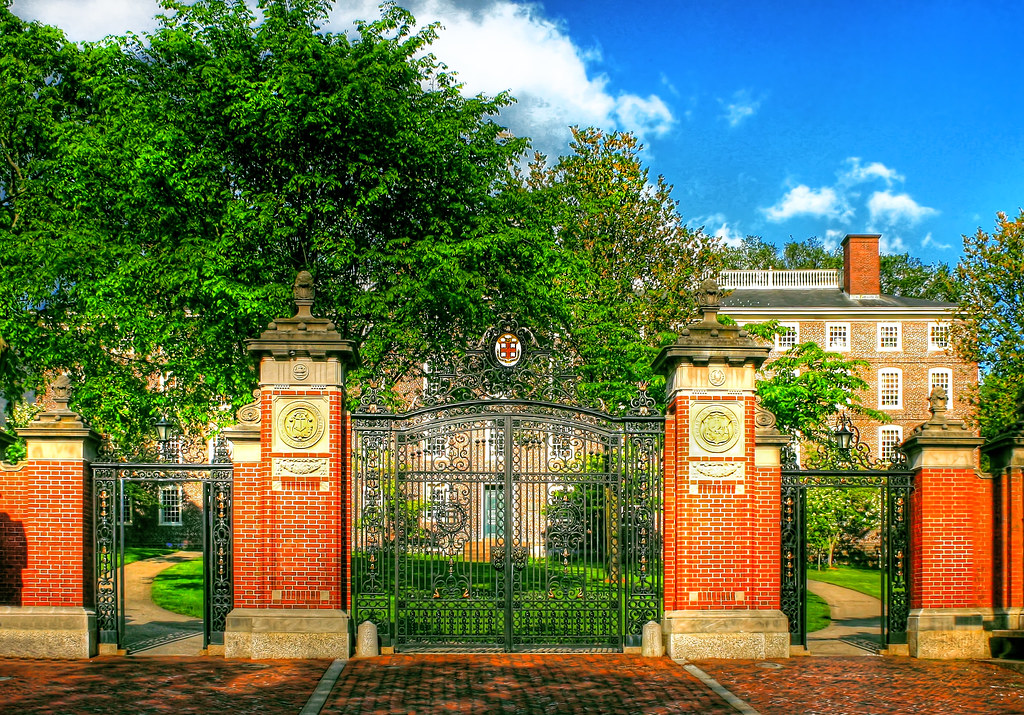
Anyone who’s worked with college essays has seen a fair share that say something like:
Part of what I’m excited about at School X is the robust Economics department, where I’ll be able to take classes like Introduction to Microeconomics and International Economics .
What’s the problem there? Well, every school with an economics department is going to offer those classes! It’s not unique, and it suggests that the author of that sentence didn’t do their research or, even worse, doesn’t really have any specific reason for choosing School X.
If you’re looking to discuss community aspects, you should do the same kind of research, perhaps focusing on:
- Unique college-wide initiatives (e.g., Dartmouth’s Sophomore Summer)
- Student clubs/organizations
- Anything specific the college stresses as a point of pride in terms of values, diversity, etc.
Researching unique offerings from these schools can be difficult: how do you know what’s unique enough to mention? Or what a particular school really prides itself on?
If you’re struggling with this first key step, reach out to one of experienced college essay coaches , who can help you through the process so you know what to write about before you start.
Step 2: Link to your story!
But that research is only half the battle. Schools don’t just want a list of what they do well. Remember our two guiding principles for these essays: prove you’ll be a good fit, and prove you’re interested.
To do that, you’ll have to connect any specific opportunities you mention with your own narrative. What about you —your experiences, passions, values, successes, failures—has led you to be interested in these specific opportunities presented by the school?
Remember that all college essays are stories. When these “Why us?” essays are perfect, it should make the admissions committee feel that your journey up to this point has naturally led you to apply to their school.
So, don’t think of this as an essay about the school itself. It is, like all these college essays, an essay about you as a person . The only difference is you have to show how your story intersects with what this particular college can do for you .

As an initial brainstorming exercise, make two columns. In the first, list all of those specifics you researched in step one. In the second column, put what connects you to each of those specific offerings. Activities you’ve been involved with, important moments in your life, values you hold dear. Wherever you have the strongest connections, that’s what you’ll write about.
Thinking strategically, you can especially focus on strong connections that also tie in to your most impressive achievements, whether academic or extracurricular, because you’ll get another chance to reference them in your supplemental essays.
For inspiration, check out 30 examples of real college essays by some of the most successful applicants in the world, who told their stories in interesting and unique ways.
Step 3: Create a frame for your essay
Each of these essays should be personalized to the school you’re applying to. But , because this is at heart an essay about yourself, you can create an introduction and conclusion (a “frame”) that you tweak only slightly for multiple schools.
The first paragraph, whenever possible, should be eye-catching and specific to you. Often, the best way to do this is with some small anecdote or mini-story from your life that contextualizes the rest of the essay.
Are you going to apply to these schools as a Math major? Well, then you might want to start the essays with a short description of the moment you fell in love with math, or with what burning questions drive you to pursue it in college.
Your last paragraph (which should be very short) can return to this story or to some other key element of yourself that explains your goals within the context of the essay. With the first and last paragraph, you should have a deeply personal frame that gives context for what you say in the body of your essay.

This frame doesn’t have to change much: if it fits for the prompt, reuse it! But do change the body paragraphs. Since those paragraphs are all about the specifics for the school you’re applying to, each of those needs to be written from scratch.
A list of Don’ts:
Writing these essays can get pretty complicated. There’s a lot of nuance, a lot of potential pitfalls, and a lot on the line (which is why you should look into working with one of our experts). But one good place to start is with what you shouldn’t do:
- Avoid all generalizations about the strength of the program, the prestige of the faculty, or the rigor of the academics.
- Avoid talking too much about the location of the school, especially for schools in major cities like NYC.
- Exception: if your application can show a demonstrated interest in a particular field (e.g., if you’ve already done research with a professor, or published something in a relevant journal), then it will seem much more believable when you reference a professor or coursework.
- Similarly, avoid name-dropping specific buildings or locations at the school as if you’ve already been there. Generally, don’t say things like “I can already see myself walking through the doors of Firestone Library.”
- Do your best to avoid stock/cliche sentences like, “I am passionate about […]” or “[…] really stands out to me as an incredible opportunity.” It’s more than likely some of these will sneak into your writing, but cut as much of them as you can.
- Don’t spend too much time describing the college’s program/club/etc. without tying it specifically to you . The admissions officers already know that their school is great, and they don’t need you to explain their special community-building outdoor adventure program! What they want to know is what is specifically attractive about that adventure program to you and how it ties into your past accomplishments and future plans.

Rules to remember
By far the best way to excel on these essays is to work with a qualified college essay coach . There’s nothing like a second set of eyes to give you perspective and guidance on your work! But regardless of whether you get assistance or set out on your own, keep the below rules in mind:
- There are no “optional” essays ! If a school offers you a prompt, always write a response.
- Balance school specifics with your own narrative. Always show how what you like about the college connects back to your experiences .
- Every sentence should be specific to you and/or the school : if you read a sentence and it could have been written by someone else or about some other school, you need a better sentence.
- Avoid generalizations; focus on specifics .
So, now that you’ve read this post and gotten a better idea of what colleges want, how do you start writing?
Download 30 College Essays That Worked
Our college essay coaches can help you through every step of the process, from that initial research to final proofreading for clarity and polish. Not only have our coaches helped students gain admission into some of the top colleges in the country, but they’ve successfully navigated that process themselves.
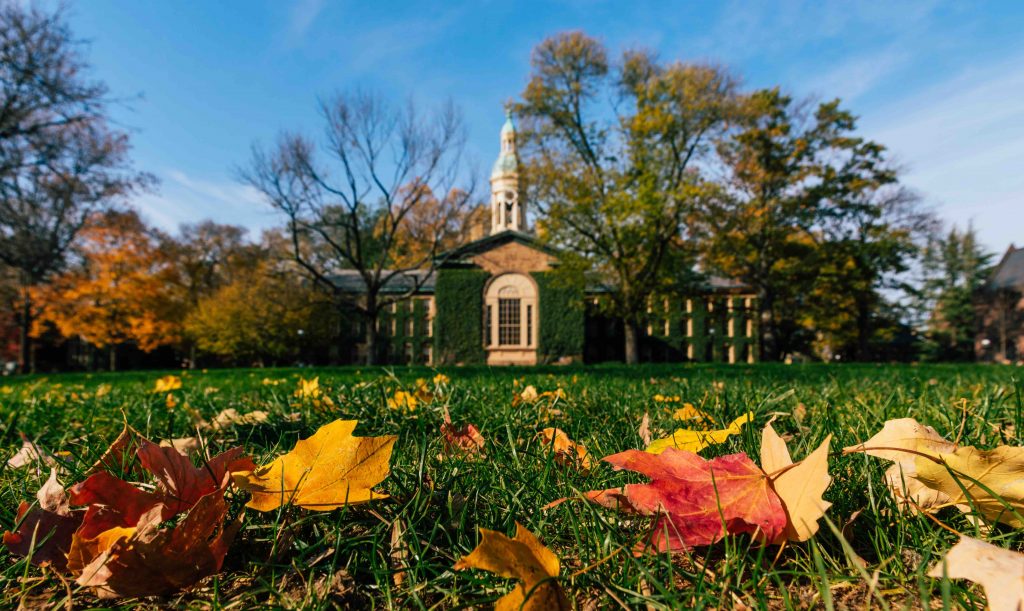
In the meantime, take a look at the examples we collected from 30 students admitted to Princeton so you can get a sense of what’s been successful in the past.
Related articles
11 College Essays That Worked 7 Qualities of a Successful College Essay 5 Ways to Structure Your College Essay The 6 Princeton Supplemental Essays: How to Respond How to Answer the Harvard Supplemental Essay Prompts How Colleges Read Your Application: A 4 Step Process What College Admissions Officers Look For: Your Data-Backed Guide 14 Best College Essay Services for 2022 (40 Services Reviewed)

Emily graduated summa cum laude from Princeton University and holds an MA from the University of Notre Dame. She was a National Merit Scholar and has won numerous academic prizes and fellowships. A veteran of the publishing industry, she has helped professors at Harvard, Yale, and Princeton revise their books and articles. Over the last decade, Emily has successfully mentored hundreds of students in all aspects of the college admissions process, including the SAT, ACT, and college application essay.
CHECK OUT THESE RELATED POSTS

15 College Essays That Worked
May 13, 2024
In this regularly updated post, we share the college essays that helped students get into their dream schools -- including Ivy Leagues.

SSAT Score Release Dates – When You’ll Get That Score Report
May 2, 2024
You've studied hard. You've taken the SSAT. Now when will you get that score report? Find SSAT score release dates and more in this regularly updated post.

SSAT Prep Resources: Your Guide
Preparing to take the SSAT? What SSAT prep resources should you be utilizing? We weigh in on the best SSAT test prep tools in this post.

Scoring on the SSAT: Your 2024 Guide
Understanding your SSAT score report can be challenging. With this detailed breakdown of SSAT scores, you'll have a firm grasp on what to expect in no time!

What is a Good SSAT Score for 2024?
What is a good SSAT score? What percentile ranking do you need to get into the school of your dreams? Find out more in this comprehensive post.

Princeton Review vs Kaplan: Which SAT Prep Service is Better?
April 29, 2024
Princeton Review and Kaplan are two of the biggest test prep services, but which one is better? Detailed review of pricing, course materials, instructor qualifications, and customer service. Choose the best SAT prep to help you raise your score…

Kaplan SAT Prep Review: Rating All of Kaplan’s SAT Prep Options
Comprehensive review of Kaplan's SAT prep services: pricing, instructor qualifications, online platform, customer service, and educational quality.

Princeton Review vs Kaplan: Which ACT Prep Service is Better?
Princeton Review and Kaplan are two of the biggest test prep services, but which one is better? Detailed review of pricing, course materials, instructor qualifications, and customer service. Choose the best ACT prep to help you raise your score…

Kaplan ACT Prep Review: Rating All of Kaplan’s ACT Prep Options
Comprehensive review of Kaplan's ACT prep services: pricing, instructor qualifications, online platform, customer service, and educational quality.

15 Best Online Writing Tutoring Services for 2024 (50 Tutoring Services Reviewed)
A list of the 15 best online writing tutoring services, reviewed and ranked. Compare prices & writing tutor qualifications. Best overall: PrepMaven’s writing tutoring ($66–349/hr). Best on a budget: Wyzant ($20–600/hr). Best…
Privacy Preference Center
Privacy preferences.

How to Write the "Why us?" College Essay
Many colleges, such as Tufts University, Bowdoin College, and Cornell University, assign the “Why us” or “Why this college” prompt as a supplemental essay. The purpose of this essay is for you to demonstrate, through concrete details and examples, why you are a great match for the school. It is also an excellent opportunity to demonstrate interest.
Colleges look for 3 main things in your “Why us” essay:
1. You understand the school and the opportunities it offers.
2. You have a plan of how you will make the most of these opportunities.
3. You can identify spaces where you can contribute to the school and its community.
Colleges rely a lot on this type of essay to determine how likely a student is to attend their school, which is a critical factor in their decision-making process as it affects their yield rate and other related statistics (acceptance rate, ranking, etc.). It is therefore important that you pay special attention to the way you craft your “Why us” essay. Read on for some Do’s and Don’t’s to help you get started.
Let’s start with some common mistakes and things to avoid.
#1 . Treat this as a “Why them” essay.
A lot of students make the mistake of only talking about the school and its cool opportunities. Great, that addresses number 1 on the list of what colleges look for in the “Why us” essay. However, it only addresses number 1, and not much else. The school knows it’s awesome. You don’t have to tell them how beautiful their buildings are, or how cool this one tradition is. They know.
Here are some common, stereotypical “Why them” statements:
1. Everyone tells me that attending your school will improve my job prospects.
2. Your faculty is world-class, and your facilities are state of the art.
3. I admire the prestige of your amazing institutions and professors.
4. Everyone knows your school and as a result I started looking at your YouTube videos and fell in love.
The reason why these statements are lacking is because they show no insight into 1) what the school is about (their values), 2) what the school offers (their resources), 3) how they would benefit you (connection to your values and interests) or 4) how you would benefit them (your contributions).
It is better to think of this essay as “Why us,” with us = college + you. Why are you perfect for each other? We provide concrete action items for how to avoid a “Why them” essay and craft a strong “Why us” essay below.
#2 . Write about school ranking, location, size, reputation, and weather.
Truth is, everyone notices those surface-level things right off the bat. Everyone knows Harvard is an Ivy League school with a reputation for academic excellence. Everyone knows Silicon Valley is in Stanford’s backyard. Chances are many other students are writing about these things, too, and you don’t want to blend in. Also, by dwelling on these things, you risk coming across as lazy for not doing deeper research.
#3 . Copy and paste from the school website or brochures.
It is critical to do careful school research, including reading the website and brochures carefully. However, don’t just simply copy and paste straight from their website. There is a chance that the person reading your essay is in fact the person who wrote the material on the website, and you don’t want this to happen. Instead, think about how you can rephrase key information in your own word, or better yet, elaborate on what these things mean to you.
#4 . Get niche information or proper names wrong.
Proofread, again and again. It already looks bad if there are typos or grammatical errors, but it would look much worse if a mascot name is misspelled, or if a niche information (such as a major) is inaccurate. If you are writing about how you are excited to work with a particular professor, triple-check that you got their name down correctly. Getting unique things wrong is the quickest way to reveal insufficient research.
Now that you know what to avoid, let’s get on with some concrete steps to write a “Why us” college essay that stands out.
#1 . Research extensively and carefully
Diligent research should be a given for any college essay, but especially so for the “Why us” college essay, as you must be able to provide specific examples for how you and the school would be a great fit for each other. While doing your research, here are a few topics you can dive into:
1. School culture (school values and vision, what the study body is like, spaces for specific identities, etc.)
2. Academic opportunities (majors, classes, professors, research opportunities & facilities, study abroad opportunities, initiatives, etc.)
3. Co-curricular activities and student organizations (student clubs, pre-professional organizations, internships and externships, fellowships, etc.)
4. Residential life (housing options, networking opportunities, food and dining, etc.)
Here are some ways you can learn more about a college:
1. Study their websites.
2. Talk to a current student or alumni. You usually can write to the college’s admission email address to ask to be connected with a student.
3. Talk to an admission officer, local rep, and/or professor.
4. Read expert reviews. Some resources you can check out are:
1. Princeton Reviews 2. Fiske Guide to Colleges 3. Colleges That Change Lives 5. Read student reviews
Unigo.com has great question prompts and a host of answers that can help you understand students’ perspectives if you don’t have the chance to talk to an actual current student or alum.
Reddit often has a subreddit that is specific to the school. You can get a lot of unfiltered thoughts about a school there.
6. Do an in-person or virtual tour 7. Attend college fairs. 8. To know about specific classes, read syllabi.
#2 . Fill out this chart (courtesy of The College Guy)
As explained above, an excellent “Why us” essay should be as much about how the college would be a good fit for you as how you would be a good fit for the school. This chart will help you organize your information and match the opportunities available at each institution with your interests, goals, and contributions.
The link itself contains columns that include a list of what you want, socially, academically and personally along with what the institution offers. This helps you correlate what you want with what the college offers, so you can connect the two in an essay. This kind of deep connection can sometimes be the make or break of acceptances at selective institutions. It will serve you well to pay attention here.
#3 . Use this opportunity to highlight your significant qualities and interests
Think of this essay as another place for you to really reiterate your significant qualities and interests, but in the context of a particular school environment. Does the college have a strong Education program with a lot of opportunities for research, student teaching, and hands-on experience? Awesome. However, this information is only relevant if you are passionate about education and want to engage in that field.
To really illustrate how you and the college would be a good match, first note down 2-3 things that you absolutely want colleges to know about you. This could be your academic interests, your personal characteristics, your niche hobbies, among other things.
Then, using your information in the chart and your 2-3 crucial things above, practice writing “Why us” statement using this formula: School feature + Connection to You = Why Us.
Example 1: The school’s emphasis on global engagement and diverse offerings of study abroad programs (School Feature) provide a platform for me to nurture my intercultural competence, which is vital to my identity as someone who has lived in four different countries (Connection to You).
Example 2: Project-based courses such as “Design Thinking & Communication” (School Feature) will help me grow as a designer (Connection to You) in developing, testing, and prototyping creative solutions while giving me the opportunity to make meaningful social contributions (Connection to You) by working with a local client to address a in the community.
#4 . Be specific
As much as the word count affords you, be specific. Provide concrete examples. Don’t just talk about general area such as “the Economics major” or “the various student clubs on campus.” Tell them what exactly about the Economics major interests you. Is it a particular class? A professor? How about research opportunities? Similar things can be asked about the “student clubs” feature.
Expand on your “Why us” statements above with more specificities. If you have mentioned your plan to pursue a particular major, follow up with a handful of classes that interest you and why, such as Example 2 above. If you are discussing the variety of student organizations, name 2-3 clubs you’d like to join that center around different interests. If you want to do research, name a center you want to be part of, or an opportunity you want to seize. In reviewing your writing, the key is to scan for capitalizations: you (almost) want to name drop!
If you only take one thing away from this blog, let it be that the “Why us” college essay should be about you and college together.
Recent Posts
What Matters in College Essays
How to Choose a Topic for the Personal Statement
Login or sign up to be automatically entered into our next $10,000 scholarship giveaway
Get Started
- College Search
- College Search Map
- Graduate Programs
- Featured Colleges
- Scholarship Search
- Lists & Rankings
- User Resources
Articles & Advice
- All Categories
- Ask the Experts
- Campus Visits
- Catholic Colleges and Universities
- Christian Colleges and Universities
- College Admission
- College Athletics
- College Diversity
- Counselors and Consultants
- Education and Teaching
- Financial Aid
- Graduate School
- Health and Medicine
- International Students
- Internships and Careers
- Majors and Academics
- Performing and Visual Arts
- Public Colleges and Universities
- Science and Engineering
- Student Life
- Transfer Students
- Why CollegeXpress
- $10,000 Scholarship
- CollegeXpress Store
- Corporate Website
- Terms of Use
- Privacy Policy
- CA and EU Privacy Policy
Articles & Advice > College Admission > Blog

Top 4 Do’s and Don’ts of Writing the "Why Us?" Admission Essay
Explaining why you're applying to a certain college can be tough—how can you put it into words? Here are a few tips for this specific admission essay prompt.
by Lindsey Conger College Counselor and Tutor, Moon Prep
Last Updated: Jan 18, 2023
Originally Posted: Nov 14, 2022
As high school seniors are writing their college admission essays, they might get stumped by the “Why This College?” prompt. This supplemental topic is asking the very specific question of why you want to attend the college you’re applying to. Taking on this essay is a great way to demonstrate your genuine interest in a particular college. Here are some top do’s and don’ts to help you write a standout “Why Us?” essay for a better chance of admission.
1. Don’t reuse one essay for every college
Admission officers can always tell if you reuse material. For example, saying “I want to attend Harvard University because it’s a great school with a welcoming community where I can truly succeed” is much too vague. You could switch out Harvard for Duke University , Brown University , or any other college, which means you’re wasting your word count. Be more specific and find reasons why you want to attend a particular school. If you do reuse essay material , ensure that you proofread it several times before submitting your applications. Nothing is worse than an admission officer reading a “Why Us?” essay that mentions another school.
Connect me with Duke! Connect me with Brown!
2. Do share concrete reasons why you want to attend
You can’t just rely on your emotions to produce a great “Why Us?” essay. Saying that you’ve been dreaming of attending a certain university since you were five years old and you’re positive it’s the right place for you is a sweet sentiment, but it doesn’t show the admission officers how you would fit in and contribute to their campus community. Give them as much reason to believe that they’re the right fit for you as you are the right fit for them.
3. Don’t mention location, weather, size, or reputation
This is a trap many students fall into, and it usually doesn’t tell admission officers anything compelling about why they should admit you over another student. However, if you can come up with an impactful reason as to why the school’s location is important to you, then it may be okay to include. For example, if you want to study International Business and you’re writing a “Why New York University ?” essay, it might be a good idea to mention that being in the middle of a vast international business hub only adds to your interest. But try to go a step further; you could specify one or two companies you might pursue internships with during your undergraduate years as well.
Connect me with NYU!
4. Do be specific about what they offer you and your goals
Vague and generic essays aren’t persuasive, so try mentioning specific classes, research opportunities, majors, activities, clubs, and traditions you want to participate in at your school of interest. If you want to become a journalist and the university is well known for journalism , make sure to not only mention that but also show why this program and school are right for you. Perhaps there’s a professor you want to work with, a club you want to join, a publication you want to contribute to, or a class you want to take. Mention anything that will show them you’ve done your homework to map out your potential future at their institution.
Related: How to Choose a College That's Right for You
While you’re writing your college admission essays, you can reuse general ideas, but you should also spend significant time researching each school you’re applying to. If you went on a college tour, mention something you learned to help personalize your essay. By showing what type of student you’ll be on their campus, the college can decide if you’re a good fit for them as well.
Don’t jump into the college essay process unprepared! We’ve got all the best advice to help you write your admission essays on CollegeXpress.
Like what you’re reading?
Join the CollegeXpress community! Create a free account and we’ll notify you about new articles, scholarship deadlines, and more.
Tags: admission essays college admission college applications college essays writing tips
← Previous Post
Next Post →
About Lindsey Conger

Lindsey Conger is a college counselor and tutor at Moon Prep .
Join our community of over 5 million students!
CollegeXpress has everything you need to simplify your college search, get connected to schools, and find your perfect fit.

Ana Sophia Garcia-Cubas Assemat
$10,000 Scholarship Winner, 2020
CollegeXpress has been an instrumental resource for my scholarship search and has given me the opportunity to try my best so I can graduate from college debt-free.
Cameron Lee
High School Class of 2022
I used CollegeXpress to search for colleges. It helped me narrow down the schools on the West Coast and which schools had Construction Engineering programs. I made my decision to go to OSU and I am so excited about it.

High School Class of 2023
CollegeXpress helped open me up to many colleges that fit my interests. I’m only a sophomore in high school, so I like having a lot to look at, and CX does a great job of picking colleges that meet my wants. It's a great website that I'll continue to use until it comes time for me to apply for colleges. I also like that it notifies me through email with options to look at. Thanks CX!

Victoria Fuss
March Madness Scholarship Winner, Class of 2022
CollegeXpress has helped me dramatically. Moving on to the next level has been a dream of my mine since I was just a young kid, and the support and help CollegeXpress has given me will help me further my education. I couldn’t be more grateful to everyone at CollegeXpress!

Rayan Hamdan
High School Student
I joined CollegeXpress just a few months ago. I had been struggling with severe anxiety, causing me to not be able to tour schools and make sure a college would be perfect for me. I came across CollegeXpress one day when I was searching for colleges online, and it completely changed the game. I was easily able to choose colleges that would suit me, and I also entered a few giveaways! Thank you so much!
Colleges You May Be Interested In
Rochester Institute of Technology
Rochester, NY
Moody Bible Institute
Chicago, IL
Hillsdale College
Hillsdale, MI
Drake University
Des Moines, IA
New York University—Abu Dhabi Campus
Abu Dhabi, United Arab Emirates
Personalize your experience on CollegeXpress.
With this information, we'll display content relevant to your interests. By subscribing, you agree to receive CollegeXpress emails and to make your information available to colleges, scholarship programs, and other companies that have relevant/related offers.
Already have an account?
Log in to be directly connected to
Not a CollegeXpress user?
Don't want to register.
Provide your information below to connect with
Calculate for all schools
Your chance of acceptance, your chancing factors, extracurriculars, concluding a 'why us' essay.
I'm writing my college application essays and wanted some advice. What's the best way to wrap up a 'Why Us' essay effectively? I don't want it to sound generic, but I'm struggling to find a good way to end it.
It's important to leave a lasting impression with your 'Why Us' essay, as this helps reinforce your genuine interest in the school. While there is no one, perfect way to do it, you might want to try some of these techniques.
1. Call back to your introduction: Reference an idea or theme from your introduction to create a full circle effect. This will help tie your whole essay together and bring it to a satisfying closure.
2. Show personal growth or connection: Demonstrate how much you have grown and how you are now prepared to take on the challenges and opportunities of college life.
3. Look to the future: Briefly discuss how you envision yourself at the college. Mention your goals, aspirations, or how you believe the school will contribute to your success. This can range from academic goals to extracurricular or professional ambitions.
4. Be concise and direct: A strong conclusion doesn't need to be lengthy. In just a few sentences, restate your main reasons or themes for wanting to attend the college, leaving a lasting and memorable impression.
Here's an example of an effective conclusion for a 'Why Us' essay:
"Ultimately, I believe that attending [College Name] will not only provide me with the academic rigor and resources necessary to excel in my field, but also expose me to a diverse and intellectually stimulating environment that fosters personal growth and meaningful connections. As an active member of the [Specific Club or Program], I look forward to engaging in meaningful conversations and collaborations with my peers, challenging myself academically, and becoming an integral part of the [College Name] community. I am eager to contribute my unique perspectives and experiences, and continue my journey of growth and discovery at [College Name]."
With this conclusion, you're able to reiterate your reasons for choosing the college, demonstrate your eagerness to contribute to the community, and leave a memorable final impression.
About CollegeVine’s Expert FAQ
CollegeVine’s Q&A seeks to offer informed perspectives on commonly asked admissions questions. Every answer is refined and validated by our team of admissions experts to ensure it resonates with trusted knowledge in the field.
What are your chances of acceptance?
Calculate for all schools, your chance of acceptance.
Your chancing factors
Extracurriculars.
How Important is the College Essay?
What’s covered:, factors that impact the importance of college essays, final thoughts, where to get your essay edited.
You know it’s important to have a high GPA, strong standardized tests scores, and extracurricular activities for your college application. But what about the essay? Just how much does it really matter to your overall academic profile?
The essay is always important, but just how much it will influence your overall application varies by the school to which you are applying, as well as your individual profile. We’ll break it down further in this post.
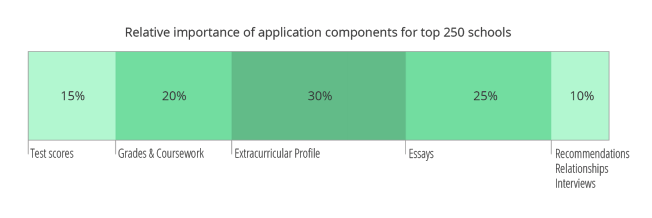
At the top 250 schools, your essays generally account for 25% of your overall application. This is only slightly behind the 30% for extracurriculars. Essays are actually ahead of the 20% for grades and coursework, 15% for test scores, and 10% for recommendations and interviews.
Now that many schools are going test-optional or test-blind , however, this breakdown changes slightly. In these situations, test scores no longer account for 15%, meaning that other portions of your application, including essays, are given more weight and consideration.
You might be surprised to learn that essays are that important, but keep in mind that at top schools, there are at least 4 academically-qualified candidates for every open spot. To truly assess an applicant’s fit with the school, admissions officers need the essays. Essays are your one opportunity to share your voice, your unique experiences, and your perspective.
While there is a general breakdown as to how important essays are, their actual influence will vary based on several factors:
1. School size and type
Huge public schools tend to have more applicants than private schools, as well as limited resources with which to evaluate candidates. State schools tend to screen candidates first using GPA and test scores, before reviewing extracurricular activities and essays. At these schools, essays matter less if you have particularly strong academics. The more selective the school, however, the more important essays are. For instance, essays likely matter more at UC Berkeley and the University of Michigan compared to the University of Nebraska or University of Arizona. This is because more selective schools often have more qualified applicants, so essays are used kind of as a tie-breaker.
In contrast, smaller colleges, especially liberal arts schools, tend to take a more holistic approach to evaluating candidates, since these colleges tend to be more self-selective and receive fewer applications. Therefore, they can devote more time and resources to each individual application.
Top private schools like the Ivies and similar-tier colleges also prefer to use a holistic approach when evaluating students, seeking to understand the candidate and their background as a whole. At top-tier colleges, many of the candidates are already excellent students who have stellar grades, test scores, and extracurricular activities, so essays provide an additional way to differentiate candidates and understand their entire profiles and personalities. As a result, essays are extremely important at these schools, even for those with stellar academics.
2. The strength of your profile
If you are a “borderline” candidate, with good but less-competitive grades and test scores, a strong essay could push you into the admitted pool. However, your essay is unlikely to compensate for grades and test scores that are too far below average, since academics are the primary basis of evaluation.
For the student who otherwise presents an outstanding profile, with a high GPA, competitive test scores, and stellar extracurricular activities, the essay may have a smaller impact on your overall application, because you have already demonstrated your ability to succeed. However, you should still aim to write a strong essay, especially if your dream colleges are highly-selective.
Under no circumstances should you ever “blow off” your college essay. Even if the rest of your profile makes you a top candidate for competitive colleges, your essay always matters. In fact, your essay could end up hurting an application for an otherwise strong candidate if it appears hastily written or not well thought-out.
3. Your intended major
Factoring in your particular interests, talents, and intended major makes the importance of the essay even more nuanced. If you intend to study a humanities subject such as Journalism, Creative Writing, or English, and list writing-oriented extracurricular activities (such as your school newspaper) on your application, your essay needs to reflect your talent and chosen major. If colleges see that your focus is writing and receive a poorly-written or uninspired essay, they will be confused — and may wonder how well you understand your own strengths.
On the other hand, if your focus is clearly on a subject in which writing personally and creatively is not as essential, such as STEM, admissions committees may provide a little more leeway and judge your essay a little less harshly. You still need to present a well-written and carefully-considered essay, of course. If you know writing is somewhat of a weakness, have teachers, guidance counselors, friends, and family members read it and offer feedback. However, colleges will generally understand that your talents lie elsewhere.
4. Test-optional/Test-blind policies
When colleges go test-optional or test-blind , standardized test scores are given less or no consideration in the admissions process. This means that the other aspects of your application will be more important. So, if you’re planning on applying to schools with test-optional or test-blind policies, keep in mind that your essays will be given even more consideration. Alternatively, if you’re applying to a school where standardized tests are required, your essays may be weighted slightly less.
In either case, you should be making sure your essays are as strong as possible. As schools are increasingly turning test-optional and test-blind in light of the COVID-19 pandemic, admissions processes are constantly changing in unpredictable ways. Your essays are the most personalized part of your application and are your chance to tell admissions officers your unique story. So, make sure that your essays are in great shape and are conveying your personality in an authentic and interesting way.
Essays are an extremely important part of the college admissions process. While certain factors may impact the relative influence of essays, you should always put in your best effort.
If you’re looking for more help on how to write a strong essay, check out these posts:
How to Write the Common App Essays (with Examples!)
How to Write the “Why This Major” Essay
How to Write the “Why This College” Essay
Want help with your college essays to improve your admissions chances? It’s always useful to have another set of eyes look at your essays to make sure they are in great shape. No matter where you are in the writing process, you can check out our Peer and Expert Essay Review to get some insight into how to improve your college essays!
With our free peer review, you can have others take a look at your essay and provide useful feedback. You can also improve your own writing skills by reviewing other students’ essays. Alternatively, try out our paid expert essay review to get expert advice and detailed tips on what to improve in your essays!
Related CollegeVine Blog Posts

Why Colleges Ask You to Write Essays
What’s the big deal with college essays? Almost every school requires them and it’s no easy feat to perfect them. Today, Ryan Hickey explains why these essays are more crucial than you might think!
In our technological age, being asked to write a full essay can seem a little antiquated. Why do colleges even ask for these? Just to torture you? More importantly, does anyone actually read them?
Rest assured that admissions officers do, in fact, read your essays. Also, admissions officers view them as an important part of your application. No matter how qualified you are, you can kill your chances with a bad essay. On the other hand, if you are minimally qualified or even if something fall bellows the minimum, like your test scores, the essay can be your chance for redemption.
Still not convinced that your essays are important? Let’s look deeper into the four main reasons that colleges require essays as part of the application process to see why they’re worth your time and attention.

1. Writing Skills
You can’t make it in college if you can’t write. At any point in time during your college education, you’ll probably have one or more papers to write for your classes. Colleges would be irresponsible to offer you a place in their program if you do not have the basic skills needed to succeed. The admissions officers want to know that you have achieved a level of literacy such that you have a solid command of grammar, sufficient vocabulary, and the ability to organize your thoughts so that you can communicate them effectively to others.
2. Critical Thinking Skills
At the collegiate level, you’ll need to dive beneath the surface of an issue and be able to defend your ideas. Even if the prompt is about a personal experience, the admissions officers will still want you to reflect a level of awareness and understanding that goes beyond the obvious. They’ll want to know that you can reflect meaningfully and think critically about yourself and the world around you.
3. A Good Fit
Do you seem like someone who will fit in at the school? If you’re a renegade, then you probably won’t be happy at a more conservative campus. If you spend your essay writing about how much you love city life, you might not enjoy the slower pace of a college town. Especially if you are applying to a college that is far away from your home, the admissions officers want to see that you will be happy in both the academic environment and the location of the school.
4. Mature Mindset
From undergraduate through doctorate, succeeding in a college degree program requires independence, the ability to overcome obstacles, and the ability to work with others who come from backgrounds that are different from yours. Your essays are necessarily a reflection of your mind, and the admissions officers want to know that you have the “soft skills” to excel in their program.
By allowing you the freedom to express yourself through your writing, the admissions officers will be able to see a real human being in ways that can’t be seen through standardized test scores, CVs or even letters of recommendation. Ultimately, that is why they ask you to write essays: to get to know you better. Therefore, use your essays to the fullest by writing well, applying critical thinking, showing that you are a good match for the school, and reflecting maturity.

Author Bio: Ryan Hickey is the Managing Editor of Peterson’s & EssayEdge and is an expert in many aspects of college, graduate, and professional admissions. A graduate of Yale University, Ryan has worked in various admissions capacities for nearly a decade, including writing test-prep material for the SAT, AP exams, and TOEFL, editing essays and personal statements, and consulting directly with applicants.

This post was written by a friend of Magoosh.
View all posts
More from Magoosh

Leave a Reply Cancel reply
Your email address will not be published. Required fields are marked *

Choose Your Test
Sat / act prep online guides and tips, 64 great colleges that don't require essays to apply.
College Info , College Essays

If the thought of writing a college essay fills you with terror, you might be wondering: are there any colleges that don't require essays?
The answer is yes, there are! This guide will give you an overview of colleges that don't require admissions essays, how to find these schools, and whether you should apply to one or not. We'll wrap up with a list of 64 colleges with no essay requirement that you can apply to.
Why Do Some Colleges Not Require an Essay?
In general, college essays help schools get a sense of you as a person—beyond your academic record, GPA, and test scores. They give you a chance to clearly articulate your goals and also give admissions officers a better idea of how you'll fit within the school's community. Finally, essays are helpful because they provide schools with concrete evidence of your writing ability.
However, there are many colleges that don't require essays for admissions. What are some reasons why? Let's take a look at the three biggest ones:
#1: Limited Resources
It takes a lot of admissions officers' time and energy to read and evaluate college essays.
At smaller schools with fewer resources, and even at larger schools that enroll tens of thousands of students, the resource costs associated with reading each essay for every single student might outweigh the benefits of getting additional information on applicants beyond GPAs, test scores, and transcripts.
Schools sometimes balance these concerns by requiring essays only for the most competitive programs (usually things such as engineering and nursing) or for scholarships, for which the additional information might be more instrumental in making decisions.

They need to use those limited resources for coffee.
#2: Specific Admissions Cutoffs/Criteria
Many colleges, particularly public schools, admit students based on a type of selection index, which tabulates some combination of GPA, test scores, and/or class rank.
If students meet the minimum index score cutoff, they will be admitted. In this case, the school might simply feel that additional information from an essay isn't necessary for making a decision regarding whether a student will be successful or not.
Selection indices are also often different for in-state and out-of-state students, with the latter being subject to more stringent academic criteria.
In addition, the selection index is sometimes used for scholarships, with students with higher index scores being awarded more money.
Schools with selection indices do often require or recommend college essays for borderline candidates so that students can provide additional information on why they'd be a good fit at the school in spite of not meeting the stated academic criteria.
#3: Make Admissions Process Easy and Appealing
Some colleges hope that by making the admissions process easy and requiring only a transcript, test scores, and basic demographic information, they'll attract a wider variety of applicants.
By presenting their application process as a simple alternative to more intensive processes that require letters of recommendation, essays, and so on, they can attract students who are on the fence about applying to college at all .
They could even potentially motivate highly qualified applicants to use them as one of their safety or match schools because the students won't need to write additional essays or do extra work to apply.
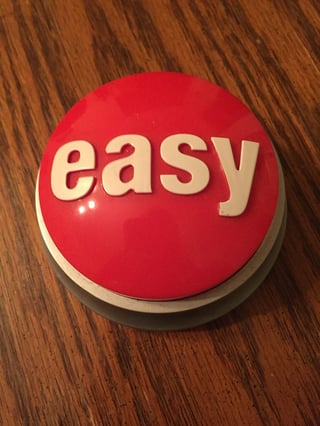
Some applications seem like you just have to click to apply!
How to Find Colleges That Don't Require Essays
There are over 4,000 postsecondary educational institutions in the US, and over 80 of these schools don't require essays for admission.
If you want to know whether a particular school requires an essay for admission, Google "[School Name] freshman admission requirements" or "[School Name] admissions essay." This should pull up pages from the school's official website, with links to guidelines on admission essays.
If, however, you're looking more generally for schools that don't require essays, you can check out our list of 64 schools below or try one of the following starting places:
Public Universities in Your State
A significant number of public universities don't require essays for admissions.
Even if the major public schools in your state (such as the University of Illinois Urbana–Champaign or UCLA) require essays for admission, you might find that the smaller campuses and smaller or more specialized state schools might not require essays. So be sure to check those out!
You can actually get a pretty robust list of schools in your state by simply Googling "[State Name] colleges." Do this and a list of colleges will appear across the top of your screen. Thanks, Google!
Schools With Automatic Admissions Criteria
A school that has criteria for automatic admission (e.g., if you live in-state and have a particular class rank, GPA, and/or test score profile) might not require applicants who meet the automatic criteria to submit essays with their applications.
However, don't assume that just because you meet automatic admissions criteria that you won't need to write an essay.
At UT Austin, for example, all students must submit an essay , regardless of whether they meet the automatic admissions criteria. Although you could probably write just a straightforward paragraph in the essay section and still get admitted (since you meet the criteria), you'd likely be hurting your scholarship potential, not to mention jeopardizing your chances of being let into your desired major.
Small Private Liberal Arts Institutions
Another group of schools that might not require essays are smaller, private liberal arts institutions. These types of schools often serve a fairly niche market and might simply not get a high enough application volume to need essays to differentiate applicants.
Community Colleges
Local community colleges do not require essays for enrollment, since most allow anyone to enroll. Some even have automatic transfer agreements with local four-year universities. However, if you want to transfer to a particular four-year university after you finish at a community college, you might very well have to write an essay—so you could just be putting off the inevitable!

You can find a lot of no-essay colleges for your basket!
Complete List: 64 Colleges That Don't Require Essays
The following chart contains 64 colleges with no essay requirement, organized by state.
Note that these are far from the only no-essay college applications —just some of the most notable. Follow our guidelines above for finding additional essay-free colleges.

Should You Apply to a College That Doesn't Require an Essay?
If you're reading this article, you're clearly worried about writing application essays for one reason or another. Maybe you're concerned about having enough time to finish everything. Or maybe you think your writing is terrible.
Here are some reasons to write college essays in spite of your misgivings:
#1: You Want to Apply to the Most Selective Schools
If you're hoping to apply to the most selective schools , you'll almost certainly have to write at least one essay. The most highly ranked no-essay school that I could find was the University of Pittsburgh—a great school. But if you're going for UChicago , MIT , Stanford , or an Ivy League-level school , you'll have to write an essay.
#2: You Want a Scholarship
Even if you do apply to a school that doesn't require an essay, you might still have to write an essay if you want to apply for the most competitive scholarships .
#3: You Have Special Circumstances to Explain
If you have any kind of special circumstance to explain—say, a dip in your grades one year due to a family illness—you definitely want to write about it in an essay. This will help you compensate for any perceived deficits in your academic record and also prevent you from being penalized in the admissions process for the vagaries of life.

There's value in telling your story to the admissions committee.
#4: You're a Good Writer
I'm thinking that most strong writers are going to actively want to write college essays, but just in case: if writing is one of your strengths, definitely write an essay. You want to show off your best qualities to admissions officers, after all! If your primary concern is time, use something like the Common Application so you don't have to write a new essay for every school.
#5: The Essay Prompt Is Short
Some college essays are barely essays at all. Some required essays have just a 250-word limit, and 500 words is pretty standard. For reference, the first section of this article—"Why Do Some Colleges Not Require Essays?"—is about 450 words, including sub-headings. That's not so bad!
#6: You Can Get Help
Although it's important that your college essays are your own work, you're allowed to get help with them! Colleges expect you to put your best foot forward, so if that means discussing ideas with parents and teachers, and having someone else look over your rough drafts and offer suggestions, that's completely fine. You don't have to go at it completely alone.
#7: You Can Reuse an Essay for All Your Schools
For schools that use the Common App , Coalition App , or Universal College App , you can generally use one essay for all your colleges. Some schools might require additional supplemental essays, though, so be sure to look that up in advance to avoid being blindsided later.
So Should I Write an Essay?
If it happens that all the schools you want to apply to don't require essays, then great! But overall, I'd say don't let the fact that a school has one (or even two) essays stop you from applying if you're genuinely interested in going there.
If you find writing essays stressful or if you're time-limited, there's nothing wrong with using some strategies to limit the number of polished essays you need to produce (such as using the Common App) and applying to a mix of essay and no-essay schools.
Key Takeaways: Colleges That Don't Require Essays
There are actually tons of colleges that don't require essays. Here are some common reasons why a college might not require an essay:
- Limited resources—it takes a lot of time and effort to read an essay by each applicant
- They might have certain GPA and/or test score admissions criteria and feel as though the information provided by an essay isn't necessary
- To make it more appealing to students by having an easier application process
So how can you find college applications without essays? Here are some places to start:
- Public schools in your state, especially smaller ones in case the bigger ones do require essays
- Schools with automatic admissions criteria—if you qualify for admission, you might not need to write an essay
- Smaller liberal arts institutions
- Community colleges
When it comes down to it, though, should you apply to colleges with no essay requirement? Here are some reasons you might want to write a college essay, even if you're apprehensive:
- The most selective colleges usually do require essays
- Scholarship applications for particular schools often require essays
- If you have special circumstances to explain, plan on writing an essay
- Strong writers should write essays to put their best foot forward
- Word limits are often very short—think 250-500 words (that's just a few paragraphs!)
- You're allowed (and encouraged) to get help with brainstorming ideas and revising drafts
- If you use an application system that can send applications to multiple schools, such as the Common App, Coalition App, or Universal College App, you might be able to write just one essay for all the schools you're applying to

No essay, no tears!
What's Next?
Need more help looking for colleges? See our step-by-step guide to college research . Also, check out how to decide where to go to college and the difference between a college and a university !
Decided to write an essay after all and need some help? Check out our comprehensive guide to writing a college essay and our guide to writing the "why this college" essay . Be sure to avoid these 10 college essay mistakes , too.

Ellen has extensive education mentorship experience and is deeply committed to helping students succeed in all areas of life. She received a BA from Harvard in Folklore and Mythology and is currently pursuing graduate studies at Columbia University.
Ask a Question Below
Have any questions about this article or other topics? Ask below and we'll reply!
Improve With Our Famous Guides
- For All Students
The 5 Strategies You Must Be Using to Improve 160+ SAT Points
How to Get a Perfect 1600, by a Perfect Scorer
Series: How to Get 800 on Each SAT Section:
Score 800 on SAT Math
Score 800 on SAT Reading
Score 800 on SAT Writing
Series: How to Get to 600 on Each SAT Section:
Score 600 on SAT Math
Score 600 on SAT Reading
Score 600 on SAT Writing
Free Complete Official SAT Practice Tests
What SAT Target Score Should You Be Aiming For?
15 Strategies to Improve Your SAT Essay
The 5 Strategies You Must Be Using to Improve 4+ ACT Points
How to Get a Perfect 36 ACT, by a Perfect Scorer
Series: How to Get 36 on Each ACT Section:
36 on ACT English
36 on ACT Math
36 on ACT Reading
36 on ACT Science
Series: How to Get to 24 on Each ACT Section:
24 on ACT English
24 on ACT Math
24 on ACT Reading
24 on ACT Science
What ACT target score should you be aiming for?
ACT Vocabulary You Must Know
ACT Writing: 15 Tips to Raise Your Essay Score
How to Get Into Harvard and the Ivy League
How to Get a Perfect 4.0 GPA
How to Write an Amazing College Essay
What Exactly Are Colleges Looking For?
Is the ACT easier than the SAT? A Comprehensive Guide
Should you retake your SAT or ACT?
When should you take the SAT or ACT?
Stay Informed
Get the latest articles and test prep tips!
Looking for Graduate School Test Prep?
Check out our top-rated graduate blogs here:
GRE Online Prep Blog
GMAT Online Prep Blog
TOEFL Online Prep Blog
Holly R. "I am absolutely overjoyed and cannot thank you enough for helping me!”
Numbers, Facts and Trends Shaping Your World
Read our research on:
Full Topic List
Regions & Countries
- Publications
- Our Methods
- Short Reads
- Tools & Resources
Read Our Research On:
Is College Worth It?
As economic outcomes for young adults with and without degrees have improved, americans hold mixed views on the value of college, table of contents.
- Labor force trends and economic outcomes for young adults
- Economic outcomes for young men
- Economic outcomes for young women
- Wealth trends for households headed by a young adult
- The importance of a four-year college degree
- Getting a high-paying job without a college degree
- Do Americans think their education prepared them for the workplace?
- Is college worth the cost?
- Acknowledgments
- The American Trends Panel survey methodology
- Current Population Survey methodology
- Survey of Consumer Finances methodology

Pew Research Center conducted this study to better understand public views on the importance of a four-year college degree. The study also explores key trends in the economic outcomes of young adults among those who have and have not completed a four-year college degree.
The analysis in this report is based on three data sources. The labor force, earnings, hours, household income and poverty characteristics come from the U.S. Census Bureau’s Annual Social and Economic Supplement of the Current Population Survey. The findings on net worth are based on the Federal Reserve’s Survey of Consumer Finances.
The data on public views on the value of a college degree was collected as part of a Center survey of 5,203 U.S. adults conducted Nov. 27 to Dec. 3, 2023. Everyone who took part in the survey is a member of Pew Research Center’s American Trends Panel (ATP), an online survey panel that is recruited through national, random sampling of residential addresses. Address-based sampling ensures that nearly all U.S. adults have a chance of selection. The survey is weighted to be representative of the U.S. adult population by gender, race, ethnicity, partisan affiliation, education and other categories. Read more about the ATP’s methodology .
Here are the questions used for this report , along with responses, and the survey’s methodology .
Young adults refers to Americans ages 25 to 34.
Noncollege adults include those who have some college education as well as those who graduated from high school but did not attend college. Adults who have not completed high school are not included in the analysis of noncollege adults. About 6% of young adults have not completed high school. Trends in some labor market outcomes for those who have not finished high school are impacted by changes in the foreign-born share of the U.S. population. The Census data used in this analysis did not collect information on nativity before 1994.
Some college includes those with an associate degree and those who attended college but did not obtain a degree.
The some college or less population refers to adults who have some college education, those with a high school diploma only and those who did not graduate high school.
A full-time, full-year worker works at least 50 weeks per year and usually 35 hours a week or more.
The labor force includes all who are employed and those who are unemployed but looking for work.
The labor force participation rate is the share of a population that is in the labor force.
Young adults living independently refers to those who are not living in the home of either of their parents.
Household income is the sum of incomes received by all members of the household ages 15 and older. Income is the sum of earnings from work, capital income such as interest and dividends, rental income, retirement income, and transfer income (such as government assistance) before payments for such things as personal income taxes, Social Security and Medicare taxes, union dues, etc. Non-cash transfers such as food stamps, health benefits, subsidized housing and energy assistance are not included. As household income is pretax, it does not include stimulus payments or tax credits for earned income and children/dependent care.
Net worth, or wealth, is the difference between the value of what a household owns (assets) and what it owes (debts).
All references to party affiliation include those who lean toward that party. Republicans include those who identify as Republicans and those who say they lean toward the Republican Party. Democrats include those who identify as Democrats and those who say they lean toward the Democratic Party.
At a time when many Americans are questioning the value of a four-year college degree, economic outcomes for young adults without a degree are improving.
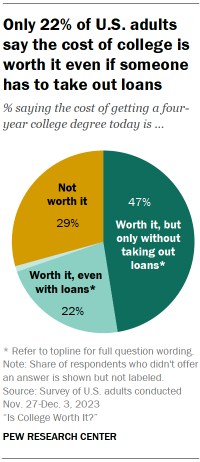
After decades of falling wages, young U.S. workers (ages 25 to 34) without a bachelor’s degree have seen their earnings increase over the past 10 years. Their overall wealth has gone up too, and fewer are living in poverty today.
Things have also improved for young college graduates over this period. As a result, the gap in earnings between young adults with and without a college degree has not narrowed.
The public has mixed views on the importance of having a college degree, and many have doubts about whether the cost is worth it, according to a new Pew Research Center survey.
- Only one-in-four U.S. adults say it’s extremely or very important to have a four-year college degree in order to get a well-paying job in today’s economy. About a third (35%) say a college degree is somewhat important, while 40% say it’s not too or not at all important.
- Roughly half (49%) say it’s less important to have a four-year college degree today in order to get a well-paying job than it was 20 years ago; 32% say it’s more important, and 17% say it’s about as important as it was 20 years ago.
- Only 22% say the cost of getting a four-year college degree today is worth it even if someone has to take out loans. Some 47% say the cost is worth it only if someone doesn’t have to take out loans. And 29% say the cost is not worth it.
These findings come amid rising tuition costs and mounting student debt . Views on the cost of college differ by Americans’ level of education. But even among four-year college graduates, only about a third (32%) say college is worth the cost even if someone has to take out loans – though they are more likely than those without a degree to say this.
Four-year college graduates (58%) are much more likely than those without a college degree (26%) to say their education was extremely or very useful in giving them the skills and knowledge they needed to get a well-paying job. (This finding excludes the 9% of respondents who said this question did not apply to them.)
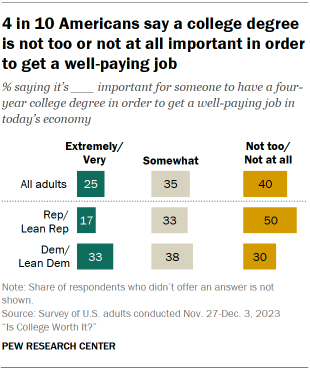
Views on the importance of college differ widely by partisanship. Republicans and Republican-leaning independents are more likely than Democrats and Democratic leaners to say:
- It’s not too or not at all important to have a four-year college degree in order to get a well-paying job (50% of Republicans vs. 30% of Democrats)
- A college degree is less important now than it was 20 years ago (57% vs. 43%)
- It’s extremely or very likely someone without a four-year college degree can get a well-paying job (42% vs. 26%)
At the same time that the public is expressing doubts about the value of college, a new Center analysis of government data finds young adults without a college degree are doing better on some key measures than they have in recent years.
A narrow majority of workers ages 25 to 34 do not have a four-year college degree (54% in 2023). Earnings for these young workers mostly trended downward from the mid-1970s until roughly a decade ago.
Outcomes have been especially poor for young men without a college degree. Other research has shown that this group saw falling labor force participation and sagging earnings starting in the early 1970s , but the last decade has marked a turning point.
This analysis looks at young men and young women separately because of their different experiences in the labor force.
Trends for young men
- Labor force participation: The share of young men without a college degree who were working or looking for work dropped steadily from 1970 until about 2014. Our new analysis suggests things have stabilized somewhat for this group over the past decade. Meanwhile, labor force participation among young men with a four-year degree has remained mostly flat.
- Full-time, full-year employment: The share of employed young men without a college degree who are working full time and year-round has varied somewhat over the years – trending downward during recessions. It’s risen significantly since the Great Recession of 2007-09, with the exception of a sharp dip in 2021 due to the COVID-19 pandemic. For employed young men with a college degree, the share working full time, full year has remained more stable over the years.
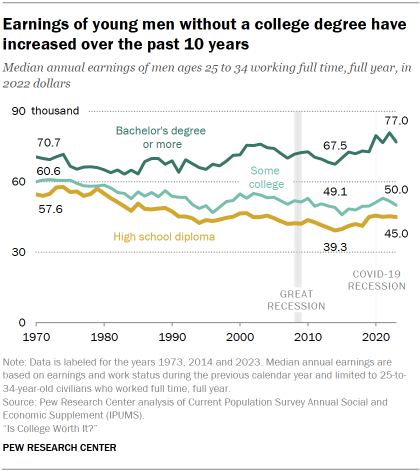
- Median annual earnings: Since 2014, earnings have risen for young men with some college education and for those whose highest attainment is a high school diploma. Even so, earnings for these groups remain below where they were in the early 1970s. Earnings for young men with a bachelor’s degree have also trended up, for the most part, over the past 10 years.
- Poverty: Among young men without a college degree who are living independently from their parents, the share in poverty has fallen significantly over the last decade. For example, 12% of young men with a high school diploma were living in poverty in 2023, down from a peak of 17% in 2011. The share of young men with a four-year college degree who are in poverty has also fallen and remains below that of noncollege young men.
Trends for young women
- Labor force participation: The shares of young women with and without a college degree in the labor force grew steadily from 1970 to about 1990. Among those without a college degree, the share fell after 2000, and the drop-off was especially sharp for young women with a high school diploma. Since 2014, labor force participation for both groups of young women has increased.
- Full-time, full-year employment: The shares of employed young women working full time and year-round, regardless of their educational attainment, have steadily increased over the decades. There was a decline during and after the Great Recession and again (briefly) in 2021 due to the pandemic. Today, the shares of women working full time, full year are the highest they’ve ever been across education levels.
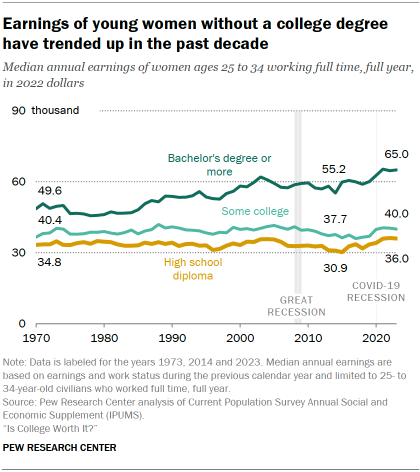
- Median annual earnings: Median earnings for young women without a college degree were relatively flat from 1970 until about a decade ago. These women did not experience the steady decline in earnings that noncollege young men did over this period. By contrast, earnings have grown over the decades for young women with a college degree. In the past 10 years, earnings for women both with and without a college degree have risen.
- Poverty: As is the case for young men without a college degree, the share of noncollege young women living in poverty has fallen substantially over the past decade. In 2014, 31% of women with a high school diploma who lived independently from their parents were in poverty. By 2023, that share had fallen to 21%. Young women with a college degree remain much less likely to be in poverty than their counterparts with less education.
Sign up for our weekly newsletter
Fresh data delivery Saturday mornings
Sign up for The Briefing
Weekly updates on the world of news & information
- Business & Workplace
- Economic Conditions
- Higher Education
- Income & Wages
- Recessions & Recoveries
- Student Loans
Half of Latinas Say Hispanic Women’s Situation Has Improved in the Past Decade and Expect More Gains
From businesses and banks to colleges and churches: americans’ views of u.s. institutions, fewer young men are in college, especially at 4-year schools, key facts about u.s. latinos with graduate degrees, private, selective colleges are most likely to use race, ethnicity as a factor in admissions decisions, most popular, report materials.
1615 L St. NW, Suite 800 Washington, DC 20036 USA (+1) 202-419-4300 | Main (+1) 202-857-8562 | Fax (+1) 202-419-4372 | Media Inquiries
Research Topics
- Email Newsletters
ABOUT PEW RESEARCH CENTER Pew Research Center is a nonpartisan fact tank that informs the public about the issues, attitudes and trends shaping the world. It conducts public opinion polling, demographic research, media content analysis and other empirical social science research. Pew Research Center does not take policy positions. It is a subsidiary of The Pew Charitable Trusts .
Copyright 2024 Pew Research Center
Is college worth it? The answer for half of Americans is striking.

A college degree has often been sold as the key to a higher-quality, affluent life. But a new survey from the Pew Research Center suggests Americans have mixed views about that narrative – and data shows people without degrees have seen their earnings increase in the last decade.
Just 1 in 4 U.S. adults said it was extremely or very important to have a four-year degree if you want a well-paying job in the current economy. Forty percent of respondents said it wasn’t too important or important at all.
Mirroring those trends, just 22% of adults said the cost of getting a bachelor’s is worth it even if it means taking out student loans. Nearly half said the cost is only worth it when students don’t have to go into debt.
Graphics explain: How are college costs adding up these days and how much has tuition risen?
Given trends in the labor and economy – combined with skyrocketing tuition and student debt levels – the lackluster confidence among Americans isn’t surprising. For several decades until about 2014, for example, the earnings for young men without a degree trended downward. But the past decade “has marked a turning point,” according to the Pew analysis.
Workforce participation for these young men has stabilized and their earnings have risen. The share of them living in poverty has also fallen significantly. In 2011, for example, 17% of young men with just a high school diploma were living in poverty; in 2023, that rate dropped to 12%. Young women’s outcomes also improved in recent years.
The changing circumstances help explain why people's mindsets about the value of college have shifted. Roughly half of Americans, according to the Pew report, say a four-year degree is less important today than it was in the past to secure a well-paying job. A smaller percentage – about a third – say it’s more important now.
The skepticism is more pronounced among conservative Americans than people who identify as Democrats or somewhat Democrat. Most Republicans (57%) said it was less important to have a four-year degree. Still, Americans from both parties are more likely to say the importance of a college degree has declined than to say it's increased.
The findings come as the Biden administration works to forgive certain borrowers’ federal student loan debt, which now totals more than $1.6 trillion. On top of barriers to covering tuition, college life has been altered this year by an uptick in culture war tensions on campus, from bans on diversity, equity and inclusion programming to student protests prompted by the Israel-Hamas war. These challenges have fueled debates about whether college is worth it.
Still, the research shows that earnings for degree holders have also trended upward. The income gaps between college graduates and those with just high school degrees or incomplete credentials have persisted.
And while employment prospects for young men without a degree improved in the past decade, their median annual earnings remain below their 1973 adjusted levels.
Financial aid crisis: How FAFSA 'fixes' have turned College Decision Day into chaos
College students who protested and those who didn't share in disappointment at response from schools

After a semester marked by sweeping protests on college campuses across the nation that raised questions about freedom of speech , how universities confront allegations of antisemitism and Islamophobia and how they invest , some students who experienced the demonstrations say they have been left disappointed by how their universities responded.
Anne-Marie Jardine, 22, who graduated from the University of Texas at Austin this year, said that while she was “really proud of my class and everyone who came out,” she was left feeling that her school “really doesn’t care” about its students.
“If you want support, if you want to feel like your voice matters, if you want to feel safe, that is not the place,” Jardine said. “I absolutely hate that school.”Jardine was one of nearly 140 people arrested during two campus protests in late April. She said she was participating in what she described as an “incredibly peaceful” protest on April 24 when law enforcement officers arrived to arrest them.

She said she was grabbed by several officers, thrown to the ground and dragged by her hair and arm, leaving her with cuts, bruises and a sprained neck, arm and lower back.“We had no idea that we were going to be met with this much violence,” Jardine said.
The university’s president on April 24 called it a “challenging day for many.”
“The protesters tried to deliver on their stated intent to occupy campus,” Jay Hartzell said. “People not affiliated with UT joined them, and many ignored University officials’ continual pleas for restraint and to immediately disperse. The University did as we said we would do in the face of prohibited actions.”
Arwyn Heilrayne, 19, a freshman at the University of Texas at Austin who also was arrested, said the school’s response to the students was enraging.
“I feel like I’m almost mourning a piece of a legacy that I thought I was stepping into,” the third-generation University of Texas student said.
“How dare they do this to my peers? The militarization of our campus makes me deeply angry,” she said.

Heilrayne said she plans to take some time this summer to “heal physically and psychologically” after the traumatic experience of being arrested by police during a protest.Both Jardine and Heilrayne were arrested on allegations of trespassing. The charges were later dropped. The University of Texas at Austin did not respond to a request for comment about the allegations.
Since mid-April, there have been dozens of protests over Israel’s war in Gaza at universities and colleges nationwide . The protests, which included confrontations between students and clashes with police at some of those campuses, have led to nearly 3,000 arrests, according to an NBC News tally. While many universities have defended the decision to call in law enforcement, the intensity of the police response in some instances has drawn harsh criticism from protesters, activists and their allies, particularly after police were called in to clear a building at Columbia University that had been occupied by protesters .
Universities have also drawn the ire of both Jewish and Muslim students who believe their warnings about rises in antisemitism and Islamophobia on campus since the start of the Israel-Hamas war on Oct. 7 have gone unaddressed.
Jacob Schmeltz, who graduated from Columbia this month, said he believed Columbia and other universities were supposed to be places that foster rational conversations around the most contentious topics and encourage dialogue “even across really painful and divisive issues.”
“Unfortunately, I have been thinking a lot about how Columbia has specifically failed this test in this regard,” said Schmeltz, 22, who is the vice president of the Jewish on Campus Student Union.
He said he was relieved to be graduating and putting the last semester behind him.
“The trust between students and the university, the trust between peers is completely broken,” he said. “Columbia has a lot of work to do over the summer to try and rebuild this trust.”
Columbia did not respond to a request for comment.

Eli Hiekali, who just graduated from the University of Southern California’s Marshall School of Business last week, said he ended the academic year stunned by what he saw on campus. He felt antisemitism overshadowed many of his interactions with protesters and said he was frustrated by the university administration. He felt they let the encampment remain on campus too long and did not adequately address concerns of antisemitism.“There is all this hate and hate doesn’t solve anything. Hopefully better days are ahead,” Hiekali, 22, said.
Jewish students who oppose Israel’s actions have also played a central role in the pro-Palestinian protests, with campus groups including Jewish Voice for Peace organizing Passover Seders at encampments and other actions .
Student protesters also criticized their schools’ handling of allegations of hate on campus.
Danica Gonzalez, a rising sophomore at the University of Southern California who participated in the protests, said she believed counterprotesters, some of whom became violent and started fights, were not scrutinized in the same way as pro-Palestinian groups.
“We’re the ones who get the cops called on us, we’re the ones who get the rubber bullets, we’re the ones who get arrested,” she said.
USC said in a statement to NBC News on Friday that “the safety and security of our entire university community has been — and remains — our top priority” and that it had taken many measures to increase safety on campus since Oct. 7.
The school also said that while it values freedom of speech, “we stand firmly against any language that calls for violence against any religious or other group. Hate speech is antithetical to our values and we stand firmly against antisemitism, Islamophobia, racism and xenophobia.”

Sinq, 18, a rising sophomore at Pomona College in California, called out what she said was a disparity with how the school addressed claims of Islamophobia compared to claims of antisemitism.“I would say there were Muslim, Arab and Palestinian students who did not receive the same type of care and commitment to their well-being as their Jewish counterparts,” she said. “The focus was always making sure Jewish students felt safe on campus, never about Muslim students. There was a huge disparity.”
Pomona College responded to NBC News with a statement saying in part, "Pomona College is committed to confronting all forms of shared ancestry discrimination in a sustained and comprehensive manner. We will continue to enforce our policies, promote safety and actively challenge these destructive forms of hate."
Dozens of encampments, many of which sprang up at campuses across the country last month as protests intensified, have been cleared this month ahead of graduation season. With their removal, some schools have reported reaching agreements with protesters on lists of demands. Many protesters had called on their schools to divest from financial support of Israel .
Harvard University announced this week that it would meet with protesters to begin to discuss disclosure and divestment. It said would also hold reinstatement proceedings for suspended students.
At the University of California, Berkeley, protesters began dismantling their encampment Tuesday after the school agreed to support and initiate a “rigorous examination” of the school’s investments. The school chancellor would also issue a public statement calling for a cease-fire.
No school has fully agreed to divestment thus far.

Gonzalez, however, said she was left frustrated about the growing rift between students and the USC administration over transparency regarding its financial investments.Sinq, who asked that her last name not be used out of safety and retaliation concerns, said she enrolled at the school because of its “commitment to social justice and intellectual passions and working towards a radically imagined world.”
“Now I realize I go to an institution that is upholding the status quo and will do everything in its power to silence and demonize students who are fighting for a better world.”
Sinq was among the protesters who camped out at the school’s graduation stage from Monday through Saturday of last week.
She said students will continue to protest through the summer in the hope of getting the university to address their concerns.
“I will continue in this deep commitment to liberation and divestment until the administration has no choice [but] to listen. I am committed to divestment even if it takes four years,” she said.
Barnard College graduate Noa Fay, who took part in Jewish activism on campus, said tension that was present during the school year also was inescapable at graduation. But she’s hopeful that her school community will find a way to move past it.
“This is not how we as a Barnard sisterhood community behave towards each other,” Fay, 23, said. “Barnard is going through some sort of tumultuous time.”
Daniella Silva is a national reporter for NBC News, focusing on immigration and education.
Alicia Victoria Lozano is a California-based reporter for NBC News focusing on climate change, wildfires and the changing politics of drug laws.
We've detected unusual activity from your computer network
To continue, please click the box below to let us know you're not a robot.
Why did this happen?
Please make sure your browser supports JavaScript and cookies and that you are not blocking them from loading. For more information you can review our Terms of Service and Cookie Policy .
For inquiries related to this message please contact our support team and provide the reference ID below.
Watch CBS News
Do you need a college degree to succeed? Here's what the data shows.
By Aimee Picchi
Edited By Alain Sherter
May 23, 2024 / 10:00 AM EDT / CBS News
College was once widely viewed as a pathway to success, but today only about 1 in 4 Americans say a bachelor's degree is necessary to secure a well-paying job, according to a new survey from the Pew Research Center.
Fifteen years ago, about 3 in 4 people told Pew that a college degree was extremely or very important to get ahead in life. The shift comes as higher education costs continue to soar, with some universities now charging close to $100,000 per year for tuition and other costs.
At the same time, employment opportunities and earnings for young men without college degrees have improved in the last decade, reversing some of the economic damage that eroded the group's fortunes starting in the 1970s.
"Things are looking up for less-educated young men," Richard Fry, senior economist at Pew, told CBS MoneyWatch. Americans' changing views about college could be based on "not just improving labor markets and outcomes for less educated young men, but it's also clear that there is concern about borrowing for college."
Young men with only a high school degree have seen a slight rebound in their earnings since 2014, Pew found. The median annual income for men 25- to 34-years-old without a college degree was $45,000 in 2023, a 15% increase from $39,300 in 2014 when adjusted for inflation, according to Pew's analysis of Census data.
Generation gap
But while less educated young men are doing somewhat better than they were a decade ago, they still haven't caught up with the earnings of older generations of men at the same age in the 1970s. In 1973, young men without college degrees were earning almost $58,000 a year. That means the typical income for this group remains 22% lower than half a century ago, according to Pew.
"If you were a high school-educated young man in the early 1970s, it was more likely you were a member of a trade union, the manufacturing employment was much greater. So, in short, starting in the 1980s things shifted away from opportunities for less educated young men," Fry noted.
"In the grand scheme of things, young, less educated men aren't where they were 50 years ago," he added.
Young women without college degrees have, in some respects, fared better than young men, partly due to their expanding job opportunities. Their earnings have bumped up from about $35,000 annually in 1973 to $36,000 today. But young women with college degrees still earn far more, at about $65,000 per year, Pew found.
More income and wealth for college grads
When asking if a college diploma is important to secure a "well paying" job today, Pew didn't define the term, leaving that open to a person's interpretation, Fry said.
But the data from Pew's analysis clearly shows that the typical college graduate today not only earns far more than their counterparts with only a high school education, but also is able to amass much greater wealth as well. In other words, a college degree opens the door to a lifetime of higher earnings, which, in turn, helps unlock ways to build wealth such as jobs with 401(k) plans and stock equity plans.
That's not to say that young workers without a college degree can't also earn higher incomes or build wealth. For instance, people who go into trades like plumbing or welding typically earn higher incomes. The median annual pay for plumbers is $61,550 — significantly higher than the typical $45,000 in annual income for high school grads, according to the Bureau of Labor Statistics.
But that's still far below the $77,000 median annual income for young male college grads and below the $65,000 median income for young women with college degrees.
Young college grads also have roughly quadruple the wealth of their less educated counterparts, Pew found. People between the ages of 25 and 34 with a bachelor's degree have an average net worth of about $120,000, versus about $31,000 for those with just a high school education.
"Higher education generates higher wealth," Fry said. "Wealth tends to come from two places: home equity and stock equity or retirement assets. Families with college-educated heads have a higher homeownership rate. And college-educated adults are more likely to have access to 401(k)s and 403(b)s," referring to employer-sponsored retirement programs.
Is college worth the money?
Half of Americans told Pew college is worth the money only if you don't have to go into debt, Pew found. Only 22% see the investment as worthwhile if you have to borrow to earn the degree.
"I'm a bit surprised at how low it is," Fry said of the 22% share, "but it suggests that how you pay for college is also of concern."
That comes as Americans have accumulated $1.7 trillion in student debt, a burden that has made it harder for some to buy homes or achieve other hallmarks of middle-class life.
Among the most skeptical about the value of college are Republicans, with the survey finding that almost 6 in 10 GOP-leaning respondents said it's less important to have a college degree today versus 20 years ago. About 4 in 10 Democrats agreed with that proposition.
Such views could amount to a red flag for the higher education sector, especially as the share of young, male high school grads who are enrolled in college has declined. And some colleges have closed in recent years due to low enrollment and other financial challenges.
"College administrations and boards and presidents should be concerned with these perceptions of the value of college," Fry said.
Aimee Picchi is the associate managing editor for CBS MoneyWatch, where she covers business and personal finance. She previously worked at Bloomberg News and has written for national news outlets including USA Today and Consumer Reports.
More from CBS News

Keyes fire officials ask for community's help as they hope to build new fire station

Memorial Day ceremonies start in Yuba City: "They gave up our tomorrow for our today"

City aims to put brakes on cars illegally driving on Sacramento bike trail

Officials share water safety tips as Folsom Lake nears full capacity

IMAGES
VIDEO
COMMENTS
37 "Why This College" Essay Examples. 1. "Why Northwestern" Essay Example. Prompt: "Why Northwestern" Statement: While other parts of your application give us a sense of who you are, we are also excited to hear more about how you see yourself engaging with the larger Northwestern community.
Step 1: How to Find All the Resources You Need to Learn about a Particular School. The Top Secret Three-Word Trick to Finding Specific Info for Your "Why this College" Essay. Step 2: Organize Your Research. Step 3: Decide on Your Approach: Approach #2: The "3-5 Unique Reasons" Strategy Approach #3: The "One Value" Strategy. How to ...
Pick your top academic reasons for applying, and your top extracurricular/social reasons. 1. Reflect on your academic and career goals. The driver behind this essay needs to be you, and not the school itself. Anyone can write nice things about the college, but only you can explain why you would be a good fit for it.
1. Research the college thoroughly: Familiarize yourself with the college's mission, unique programs, campus life, and academic opportunities. Use their website, social media pages, and information sessions to gather information. 2. Be specific: Include the names of programs, courses, professors, clubs, or campus traditions in your essay.
5 Tips for Writing a Great "Why This College" Essay. Follow the five tips below to help your "why this school" essay leave a memorable impression on admissions officers. 1. Treat Each "Why Us" Essay Individually. Although it may seem tempting to write one essay about why you want to attend college and send it to every school, this strategy isn ...
1. Brainstorm a list of reasons you want to attend the college. This should be a mix of aspects you like about that college and the things you bring to the table as a student. Try to come up with at least 15-20 reasons. You likely won't use all of them in your essay, but you'll have plenty of options to choose from.
6. Tailor your essay to the specific college: Each 'Why Us' essay should be unique to the college you're applying to. Avoid generic statements that could apply to any institution. Rather, customize your essay to the specific attributes and opportunities that make this college the right fit for you. 7.
college essay prompts: Colorado College: "Describe how your personal experiences with a particular community make you a student who would benefit from Colorado College's Block Plan." Tufts University: " I am applying to Tufts because…. Tulane University: "Describe why you are interested in joining the Tulane community.
The key to a strong 'Why Us' essay is to show genuine interest and knowledge about the college, while also demonstrating how you would fit in and contribute to the campus community. Here are a few tips to get you started: 1. Do thorough research: Go beyond the college website and explore resources like student blogs, campus newspapers, and ...
Here are some tips for researching schools for the "Why This College" essay, especially if you can't go visit the college. 1. Make a list of the reasons you decided to apply. This is a great starting point for your school research. After all, you can't try and learn everything there is to know about a school, hoping you'll find some ...
Hello! Writing a 'Why Us' essay can seem challenging, but with the right approach, you can demonstrate your genuine interest and fit for the college. Here are some tips and strategies to consider: 1. Research the college: Spend time on the college's website, read the mission statement, explore academic programs, professors, student clubs, and ...
One thing this essay could do to make it stronger is improve the first paragraph. The student does a good job of setting up Sister Roach and the Five C's, but they don't mention anything about their desire to study or pursue nursing. The first paragraph mentions both Sister Roach and Penn, but left out the student.
College admission essays often have a specific prompt to get the gears in your mind turning. Many schools ask students to respond to a prompt like one of the following: Describe the unique qualities that attract you to the specific undergraduate College or School (including preferred admission and dual degree programs) to which you are applying ...
3. Examples with NYU Excerpt. Finally, think about this supplemental essay as a way to express how compatible you are with the college you are applying to. You can talk about university programs in relation to your interests, but you can also connect it to something about you. This is how you connect point 1 + 2.
Step 3: Create a frame for your essay. Each of these essays should be personalized to the school you're applying to. But, because this is at heart an essay about yourself, you can create an introduction and conclusion (a "frame") that you tweak only slightly for multiple schools.
Colleges look for 3 main things in your "Why us" essay: 1. You understand the school and the opportunities it offers. 2. You have a plan of how you will make the most of these opportunities. 3. You can identify spaces where you can contribute to the school and its community. Colleges rely a lot on this type of essay to determine how likely ...
Give them as much reason to believe that they're the right fit for you as you are the right fit for them. 3. Don't mention location, weather, size, or reputation. This is a trap many students fall into, and it usually doesn't tell admission officers anything compelling about why they should admit you over another student.
4. Be concise and direct: A strong conclusion doesn't need to be lengthy. In just a few sentences, restate your main reasons or themes for wanting to attend the college, leaving a lasting and memorable impression. Here's an example of an effective conclusion for a 'Why Us' essay: "Ultimately, I believe that attending [College Name] will not ...
No. Definitely all top colleges but NOT all T100s. Ohio State is ranked in the 50s on usnews and they don't require any supplemental essays whatsoever. 1.1M subscribers in the ApplyingToCollege community. r/ApplyingToCollege is the premier forum for college admissions questions, advice, and….
Admissions officers use college admissions essays to evaluate your character, writing skills, and ability to self-reflect. The essay is your chance to show what you will add to the academic community. The college essay may be the deciding factor in your application, especially for competitive schools where most applicants have exceptional ...
At the top 250 schools, your essays generally account for 25% of your overall application. This is only slightly behind the 30% for extracurriculars. Essays are actually ahead of the 20% for grades and coursework, 15% for test scores, and 10% for recommendations and interviews. Now that many schools are going test-optional or test-blind ...
Let's look deeper into the four main reasons that colleges require essays as part of the application process to see why they're worth your time and attention. 1. Writing Skills. You can't make it in college if you can't write. At any point in time during your college education, you'll probably have one or more papers to write for your ...
Western Oregon University. Required only for students who don't meet minimum academic requirements. Admission primarily via GPA (3.0+) and recommendation; test optional except for students applying for scholarships and honors, or for those who don't meet minimum academic requirements. Eastern Oregon University.
According to U.S. News & World Report, Ivy League graduates with approximately three years of professional experience earned a median annual salary of $86,025 in 2022, compared to graduates of ...
About a third (35%) say a college degree is somewhat important, while 40% say it's not too or not at all important. Roughly half (49%) say it's less important to have a four-year college degree today in order to get a well-paying job than it was 20 years ago; 32% say it's more important, and 17% say it's about as important as it was 20 ...
A college degree has often been sold as the key to a higher-quality, affluent life. But a new survey from the Pew Research Center suggests Americans have mixed views about that narrative - and ...
"If you want support, if you want to feel like your voice matters, if you want to feel safe, that is not the place," one student said. "I absolutely hate that school."
May 23, 2024 at 10:00 AM EDT. Close to 30% of Americans said a college degree isn't worth it in a survey from Pew Research Center that highlights the drag soaring costs have had on views about ...
College was once widely viewed as a pathway to success, but today only about 1 in 4 Americans say a bachelor's degree is necessary to secure a well-paying job, according to a new survey from the ...